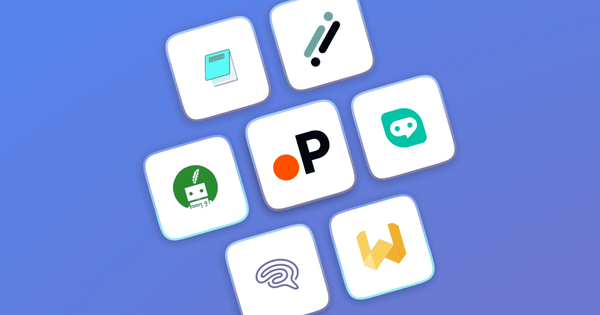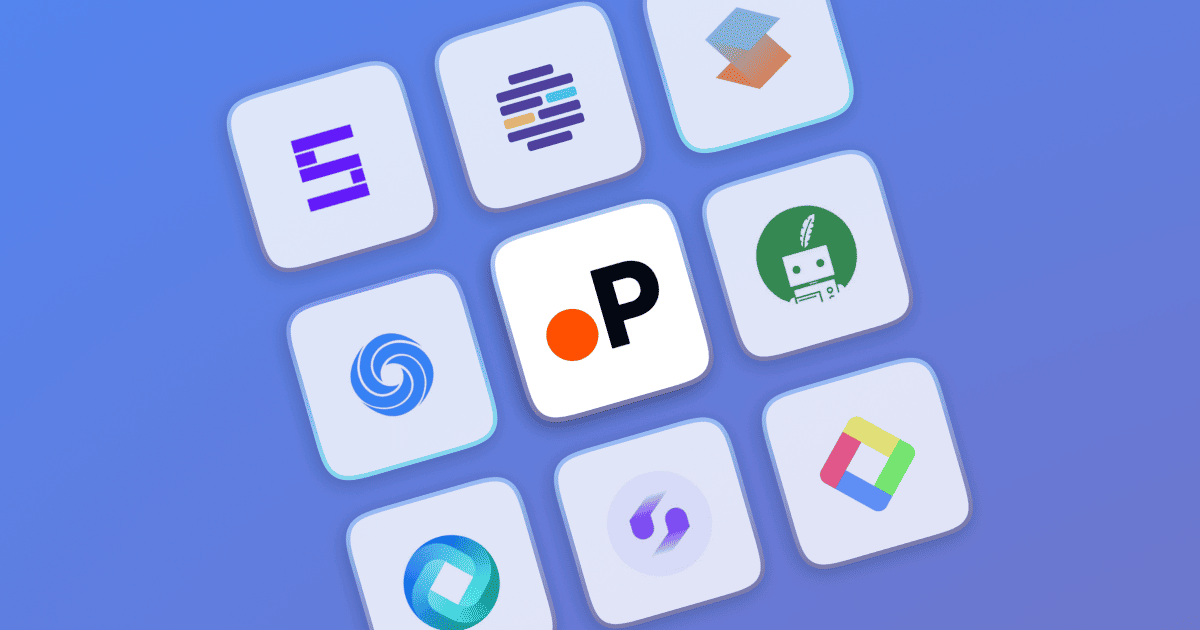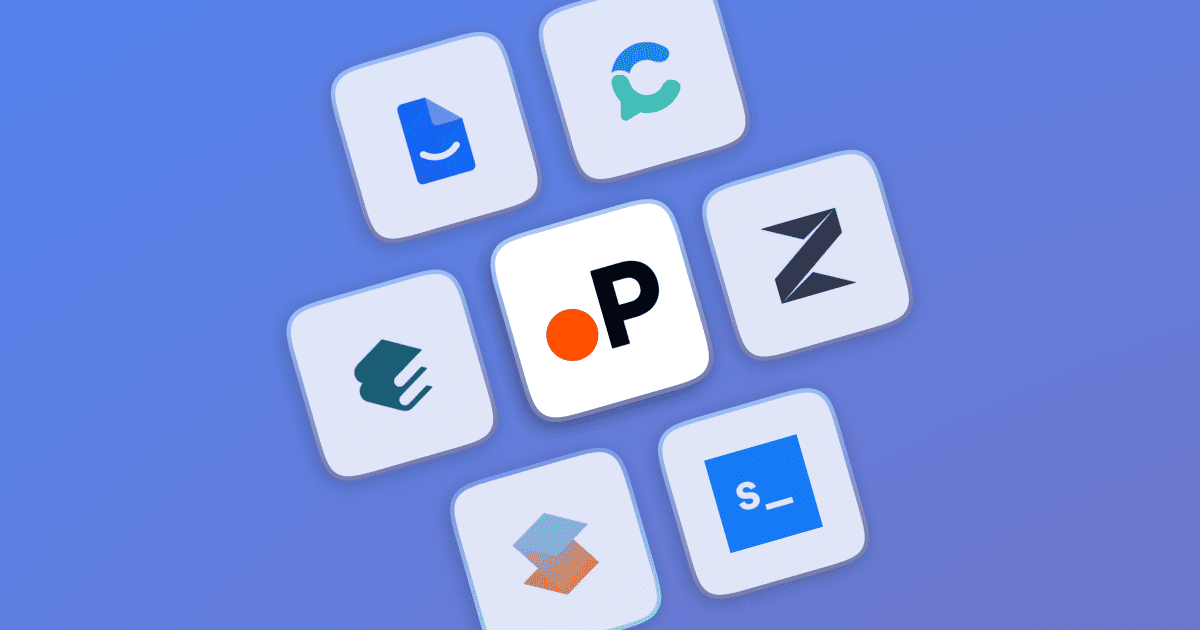15+ Best AI Tools for Scientific Research in 2026
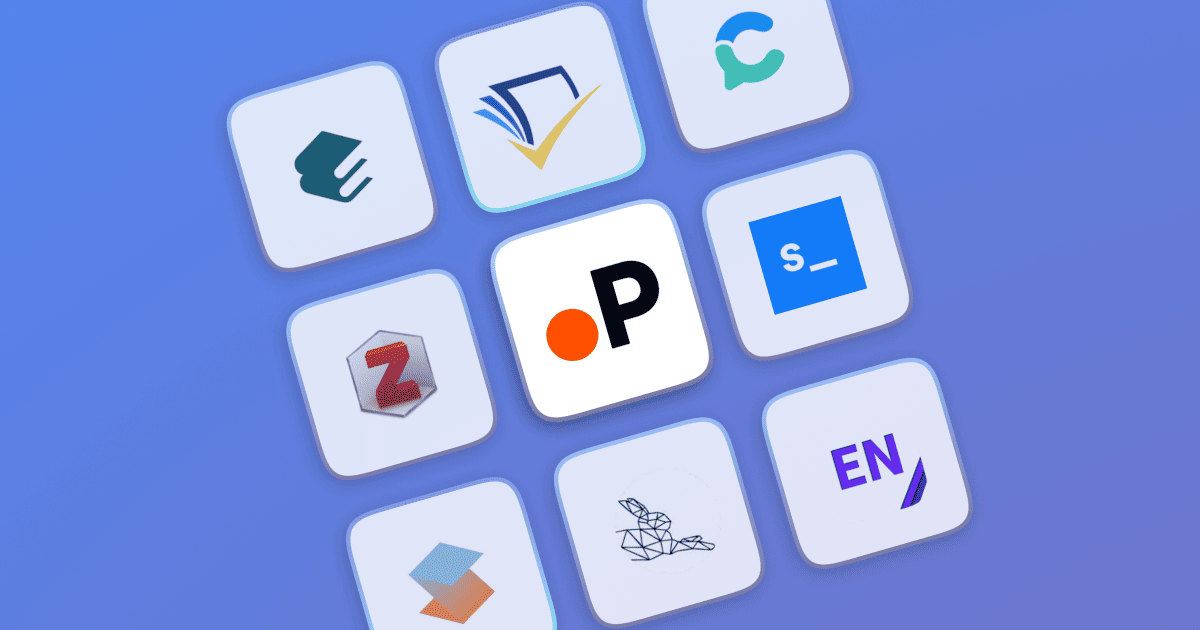
Over the past two years, the process of scientific research has been significantly transformed by the rise of artificial intelligence (AI) and large language models (LLMs). Researchers across STEM fields including biology, chemistry, physics, engineering, and mathematics now rely on AI tools for scientific research to streamline repetitive tasks, boost accuracy, and accelerate discovery.
These AI tools support everything from scientific literature reviews and article writing to research publishing and data analysis. Many platforms also offer free AI tools for scientific research and data analysis, making them accessible to students, faculty, and professional scientists alike.
Whether you're a graduate student, academic author, or part of a collaborative STEM lab, choosing the right tool is crucial. In this article, we explore 15+ of the best AI tools for scientific research researchers are actively using in 2026, including free options, to help you write scientific papers that get published faster, with greater accuracy and higher impact.
What Are the Best AI Tools for Scientific Research in 2026?
The best AI tools for scientific research in 2026 include Paperguide, Paperpal, SciSpace, Elicit, Scite, Consensus, and Zendy. These tools assist researchers in searching literature, analyzing papers, generating citations, and improving academic writing using AI. Many of these platforms excel as Literature Review AI tools, helping researchers efficiently evaluate, compare, and synthesize evidence. By automating key tasks in the literature review process, these tools enable researchers to enhance their workflow and focus on critical analysis, making them indispensable for scientific research in 2026.
Paperguide stands out as one of the best Literature Review AI tools in 2026, offering AI-powered research assistance, citation generation, and evidence synthesis. Its AI literature review capabilities help researchers automate the literature review process, saving valuable time and improving research accuracy.
What Is Scientific Research and Why Is It Important?
Scientific research is a structured process that generates knowledge through experimentation, data analysis, and evidence-based reasoning. It helps researchers discover new information, test hypotheses, and build upon existing scientific literature. Key tasks in this process include literature reviews, research paper writing, citation management, and data interpretation.
Scientific research is crucial because it drives progress in science, medicine, technology, and public policy. In STEM fields such as biology, chemistry, physics, and engineering, research leads to innovation, solves real-world problems, and informs critical decisions. It also forms the foundation for understanding the world and applying knowledge to improve quality of life.
For scientific research workflows, a Paperguide literature review AI tool can help you efficiently analyze academic papers, identify key findings, and summarize them into structured insights, saving you time
What Makes an AI Tool Ideal for Scientific Research?
AI tools for scientific research are designed to simplify complex academic workflows such as literature discovery, data analysis, scientific paper writing, and research publishing. Below are the key features to consider when choosing a scientific research AI tool in 2026. Additionally, using an Paperguide'AI literature review tool, researchers can streamline the literature review process, saving hours and focusing more on interpretation and writing.
Key Features for Choosing a Scientific Research AI Tool in 2026
| Feature | Why It Matters |
|---|---|
| Evidence-Based Outputs | The best scientific research AI tools include citations from peer-reviewed sources, boosting credibility and improving scientific research publishing impact factor. |
| Research-Focused Functionality | AI tools for scientific literature review and scientific research writing offer features like summarization, citation formatting, and data extraction. |
| Workflow Integration | The tool should support files such as PDFs and CSVs and integrate with tools like Zotero, EndNote, and Mendeley. |
| Accuracy and Reliability | AI tools for data analysis must understand scientific methods, terminology, and evidence-based reasoning with precision. |
| Transparency and Accessibility | Tools should allow users to verify sources and support both beginners and experienced researchers. |
Quick Comparison Table: Best AI Tools for Scientific Research in 2026
| Tool | Best For | Key AI Features | Pricing |
|---|---|---|---|
| Paperguide | End-to-end academic research & writing | AI Search, Literature Review, AI Writer, Reference Manager, Deep Research | Free, $12–$24/month |
| Semantic Scholar | Discovering and prioritizing research papers | AI-powered Paper Ranking, TLDRs, Citation Graphs, Topic Filters | Free |
| Elicit | Systematic reviews & data extraction | Literature Q&A, Structured Extraction, Research Reports | Free, $12–$42/month |
| Consensus | Finding scientific consensus | Claim-backed Answers, Study Snapshots, Paper Chat | Free, $12–$13/month |
| Scite | Citation credibility & context analysis | Smart Citations, Citation Classification, Research Assistant | $12/month |
| SciSpace | AI writing & PDF interaction | Copilot Chat, Paraphraser, Citation Generator | Free, $12–$70/month |
| Julius AI | Data analysis via natural language | GPT-4/Claude, Charts, File Support, Notebooks | Free, $20–$45/month |
| Connected Papers | Visualizing related literature | Literature Graphs, Prior/Derivative Papers, Multi-Seed Comparison | Free, Contact Sales |
| ResearchRabbit | Literature mapping & author tracking | Visual Discovery, Personalized Recs, Author Networks | Free |
| Scholarcy | Paper summarization & flashcards | Robo-highlighting, Summary Cards, Reference Extraction | Free, $10/month |
| Iris AI | Concept mapping across disciplines | Smart Search, Concept Mapping, Literature AI | Custom Pricing |
| Zotero | Reference & citation management | Citation Sync, PDF Annotation, Group Libraries | Free, $20–$120/year |
| EndNote | Power users needing advanced citation | AI Takeaways, Journal Finder, PDF Citation | ₹14,944–₹27,397 one-time |
| Mendeley | Collaborative citation + social features | PDF Sync, Research Recs, Mobile Access | Free, $5–$15/month |
| Labster | STEM lab simulations & training | 3D Labs, VR Support, Assessments | $8.33+/student/month |
| MATLAB | Scientific computing & modeling | Math Modeling, Data Viz, Machine Learning Toolbox | $860+/year |
Detailed Overview: Top 15+ AI Tools for Scientific Research in 2026
| Tool | Description |
|---|---|
| Paperguide | All-in-one AI research assistant for academic & scientific research. |
| Semantic Scholar | Free academic search engine that uses AI to find and prioritize relevant papers. |
| Elicit | AI assistant for research question answering and systematic reviews. |
| Consensus | Extracts scientific consensus from research papers instantly. |
| Scite | Shows how papers cite each other—support, contrast, or mention. |
| SciSpace | AI Copilot for reading and explaining research PDFs. |
| Julius AI | Performs data analysis and modeling from spreadsheets or datasets. |
| Connected Papers | Visual map of related academic papers and concepts. |
| ResearchRabbit | Graph-based tool for literature discovery and author tracking. |
| Scholarcy | Summarizes papers into structured formats with highlights. |
| Iris AI | Discovers and organizes research around specific problems. |
| Zotero | Reference manager for organizing and citing research sources. |
| EndNote | Premium citation and bibliography manager used in institutions. |
| Mendeley | Reference tool with academic social features and citation export. |
| Labster | Interactive 3D lab simulations for science education and training. |
| MATLAB | Industry-grade tool for scientific computing, modeling, and data analysis. |
Let’s now explore each tool in detail, including its key features, pricing, and best use case in scientific research and writing.
1. Paperguide
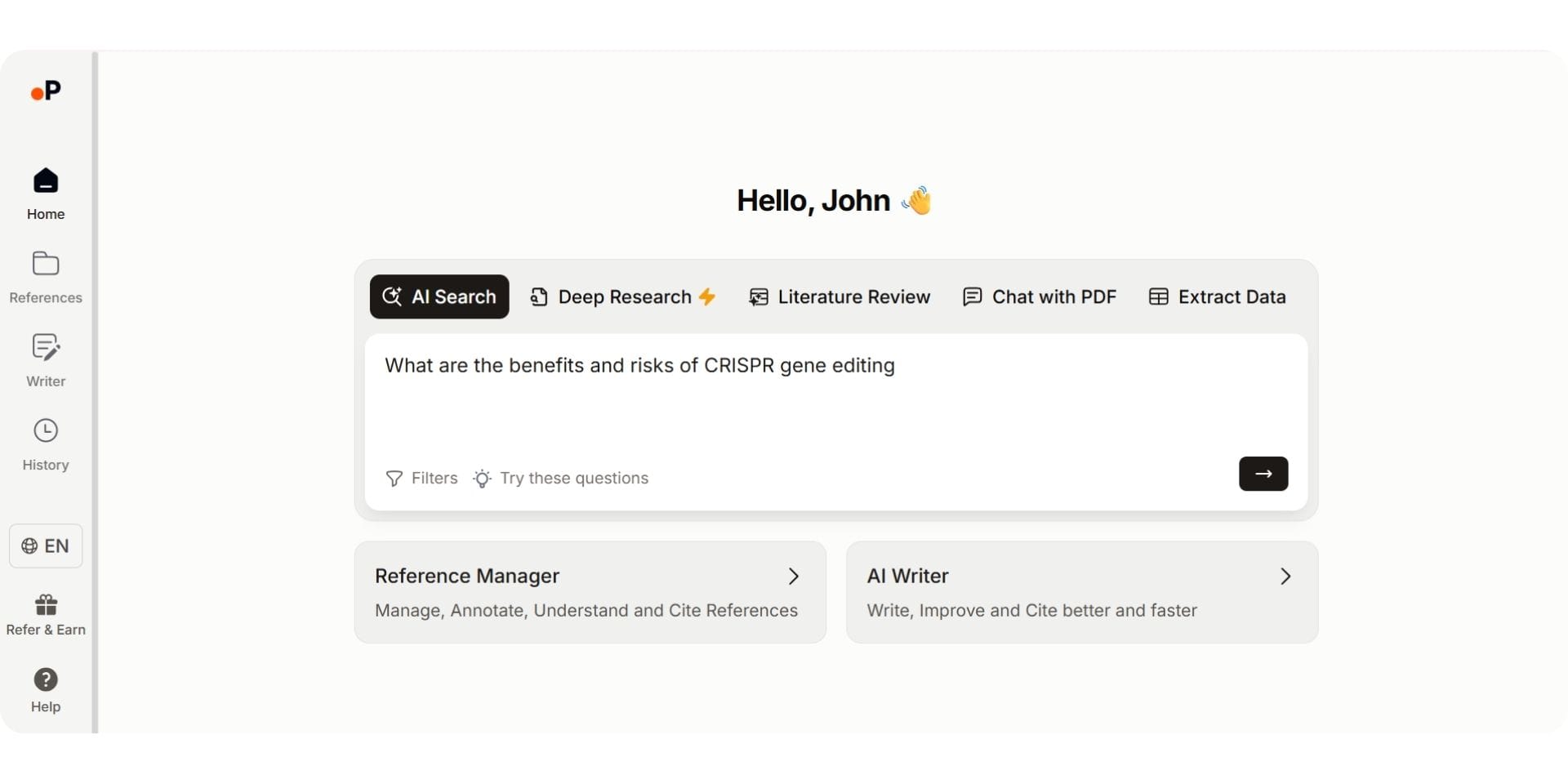
Paperguide is an all-in-one AI research assistant for academic and scientific research, designed to streamline the entire research process. It helps researchers manage every stage of their workflow, including literature discovery, data analysis, reference management, and manuscript writing. It is especially valuable for conducting systematic reviews, meta-analyses, or preparing scientific papers for publication. Considered one of the best AI tools for literature review in 2026, Paperguide simplifies the process of synthesizing research, analyzing data, and generating citation-backed content, all within a single platform.
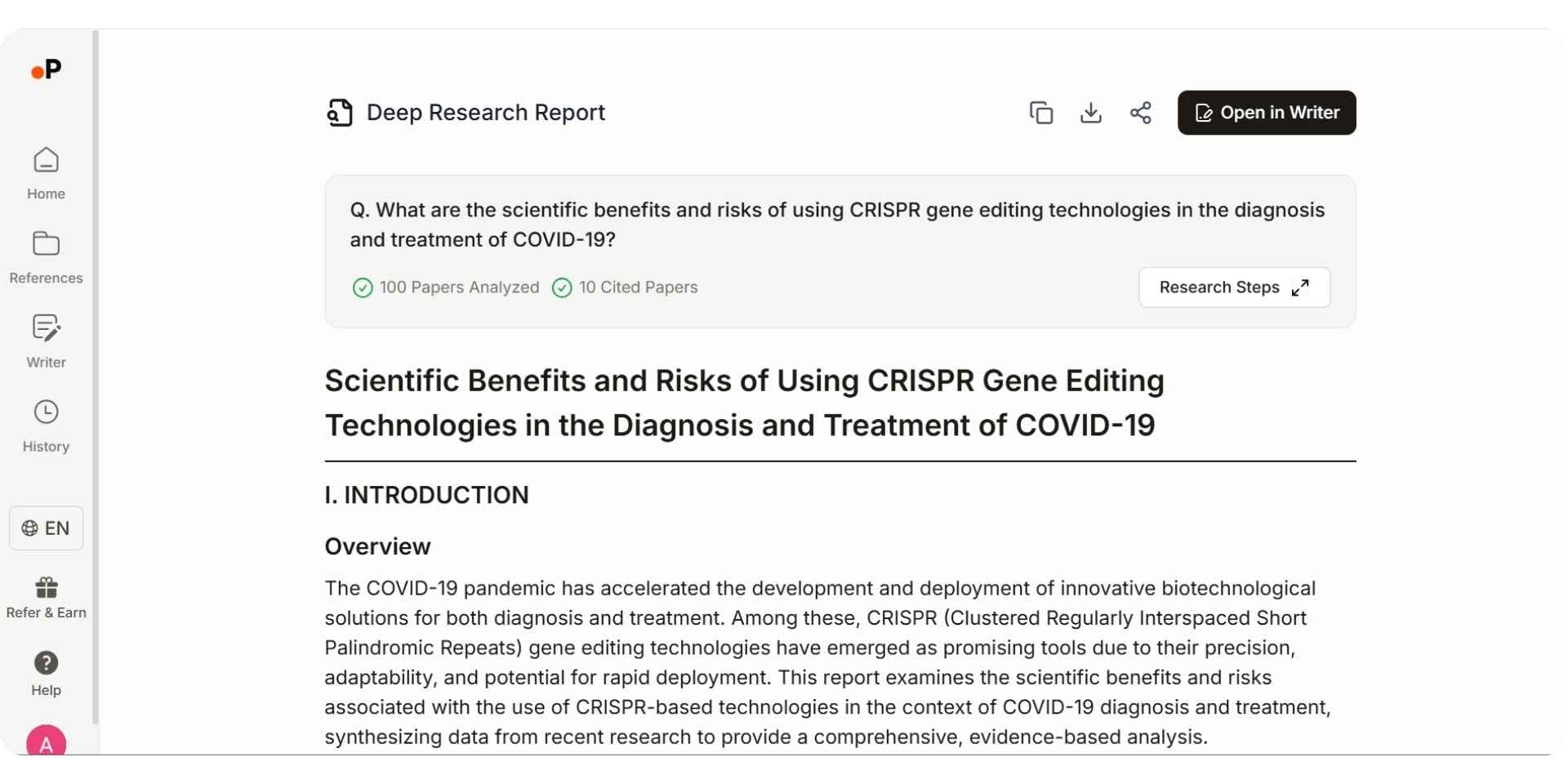
Paperguide’s Deep Research AI feature allows users to analyze hundreds of scientific papers in minutes. It extracts study methods, sample sizes, outcomes, and key findings into a structured report. This makes it ideal for scientific literature review, evidence synthesis, and comparative research in fields such as medicine, public health, environmental science, and computer science.
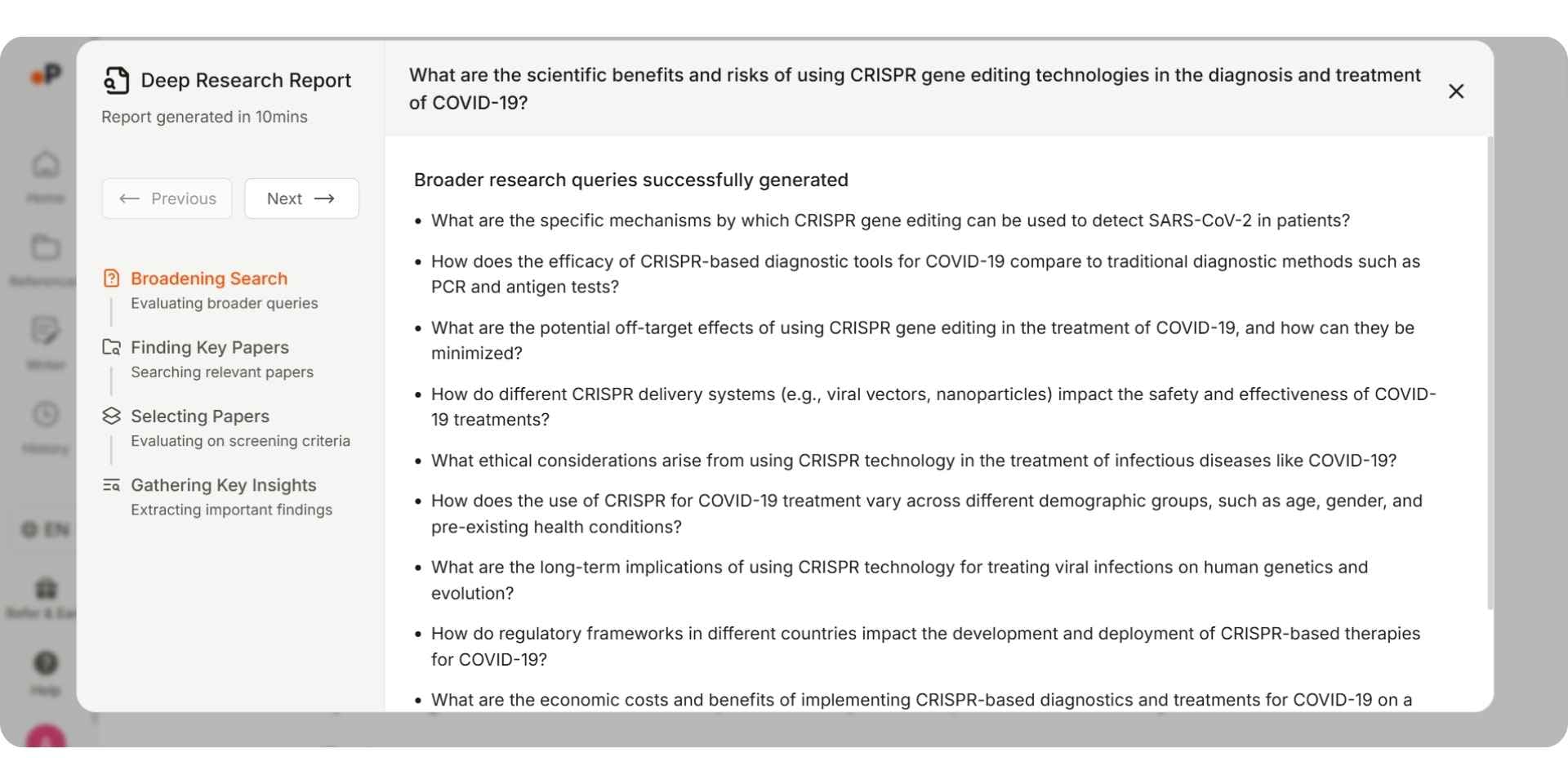
The entire process, from broad searching to selecting key papers and extracting main insights, takes just minutes with Paperguide. It can analyze over 100 papers at once and highlight the most cited and relevant studies, removing the need to manually go through dozens of PDFs. Researchers can focus more on understanding and writing instead of spending hours on data collection.
Key Features
- AI Deep Research: Summarizes study design, results, and key variables across a collection of papers
- AI Search: Answers scientific questions using context-aware retrieval from over 200 million research articles
- AI Literature Review: Organizes and compares data points, outcomes, and methodologies
- AI Paper Writer: Generates citation-backed content for scientific research writing and academic publishing
- AI Reference Manager: Supports Zotero, BibTeX, RIS, and DOI imports with automatic paper summaries
- Chat with PDFs: Allows targeted questions and returns cited answers from uploaded documents
- Citation Management: Supports over 1,000 academic and scientific journal formats
Best Use Case
Ideal for researchers who need to write scientific papers that get published, conduct systematic reviews, or analyze large volumes of literature in technical domains. Also valuable for research teams and individuals looking for free AI tools for scientific research that combine writing, reviewing, and citation management in one place.
Pricing
- Free: 5 AI generations per day and 2 Deep Research reports per month
- Plus: $12 per month with unlimited generations and 10 Deep Research reports
- Pro: $24 per month with 50 reports and analysis of up to 100 papers per project
- Teams: Starts at $8 per user per month with collaboration and shared workspace features
Pros
- All-in-one platform combining AI tools for scientific research, writing, and citation
- Deep Research simplifies data analysis and literature comparison
- Cited responses and reference integration support publication-ready output
- Offers a strong free plan and flexible upgrades
- Designed for researchers working with high-volume scientific content
Cons
- Deep Research AI is a new feature and may occasionally show minor bugs
- Advanced tools can feel excessive for users who only need quick summaries
- Collaboration features are limited to the Teams plan
Final Verdict
Paperguide is the most comprehensive AI tool for scientific research workflows in 2026, combining literature review, deep analysis, citation management, and academic writing in one seamless platform. With a generous free plan and powerful features available at budget-friendly pricing, it’s one of the best value-for-money tools for researchers aiming to publish faster and more accurately.
2. Semantic Scholar
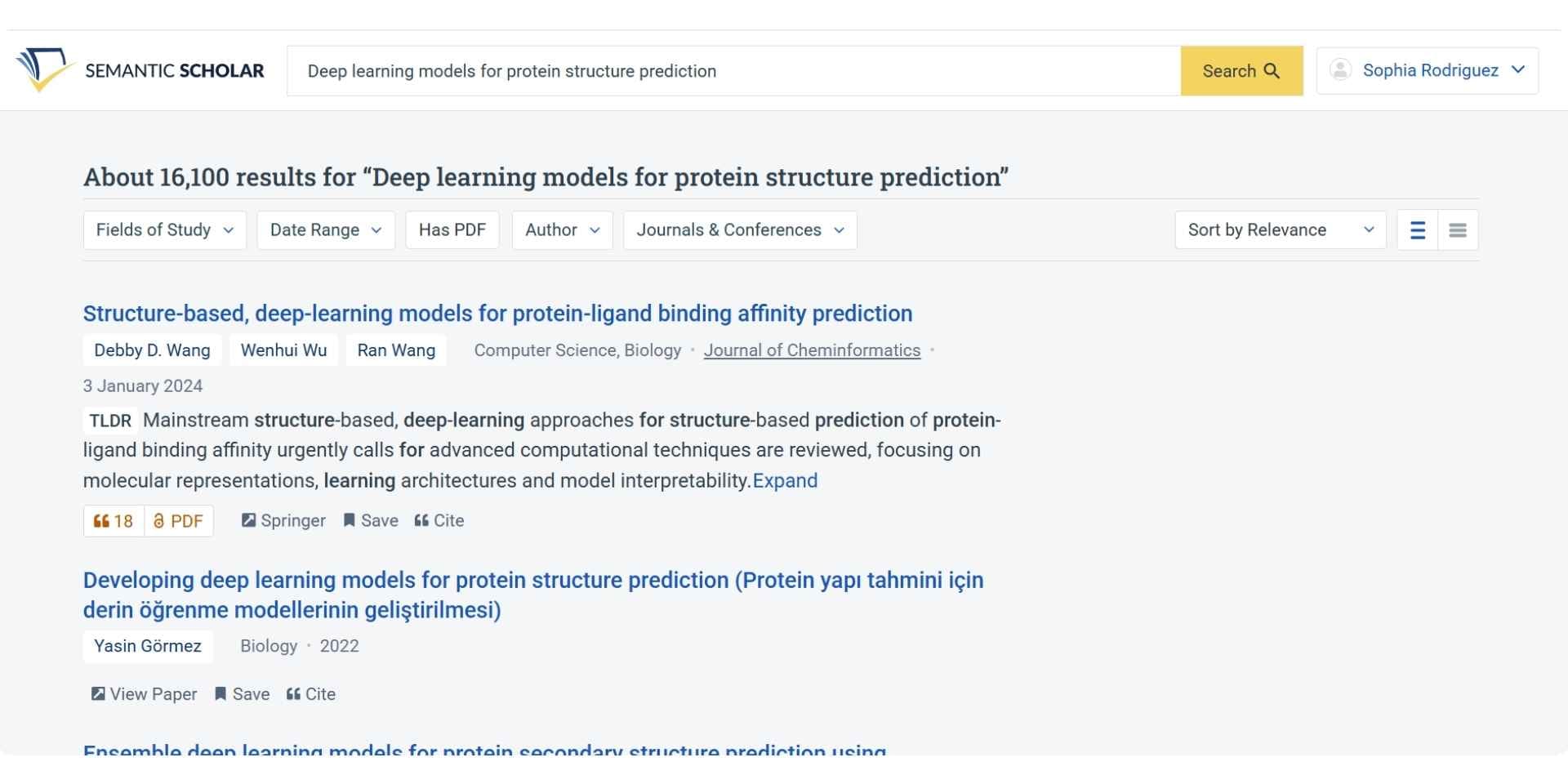
Semantic Scholar is a free AI tool for scientific research developed by the Allen Institute for AI. It is designed to help researchers quickly discover relevant academic papers by understanding the meaning behind their queries, not just keywords. Its AI-powered search engine supports scientific literature review, citation analysis, and tracking of research impact across millions of peer-reviewed papers.
With its intuitive interface and semantic understanding, it is especially helpful for early-stage literature exploration, staying updated with new publications, and identifying high-impact studies—making it a valuable productivity tool for researchers in all fields.
Key Features
- AI-Powered Search: Finds relevant scientific papers using natural language queries across 200+ million publications
- TL;DR Summaries: Generates one-sentence summaries highlighting a paper’s key findings
- Research Feeds: Delivers personalized paper recommendations based on user interests
- Citation Analysis: Tracks highly cited and influential papers within a field
- Semantic Reader: Enhances reading with context-aware definitions and highlights
- Author Profiles: Displays networks, affiliations, and publication history
- Research Trends: Helps track evolving topics and emerging scientific themes
Best Use Case
Ideal for researchers conducting literature reviews, exploring new topics, or looking for high-impact studies in biomedical science, computer science, and interdisciplinary domains. As one of the best free AI tools for scientific research, it’s especially helpful for beginners aiming to boost research productivity and stay up to date.
Pricing
- Free: Full access to all features with no premium plans or usage limits
Pros
- One of the most powerful free AI tools for scientific research
- Delivers fast, accurate, and context-aware search results
- Covers a broad range of scientific disciplines
- Clean, intuitive interface with personalized updates
Cons
- Lacks advanced filtering for complex literature review workflows
- No built-in citation management or export options
- Limited customization for research organization
Final Verdict
Semantic Scholar is the best free AI tool for academic paper discovery and early-stage literature reviews. Its semantic search, one-line summaries, and citation tracking make it ideal for researchers who want fast, intelligent insights without the need for premium subscriptions.
3. Elicit
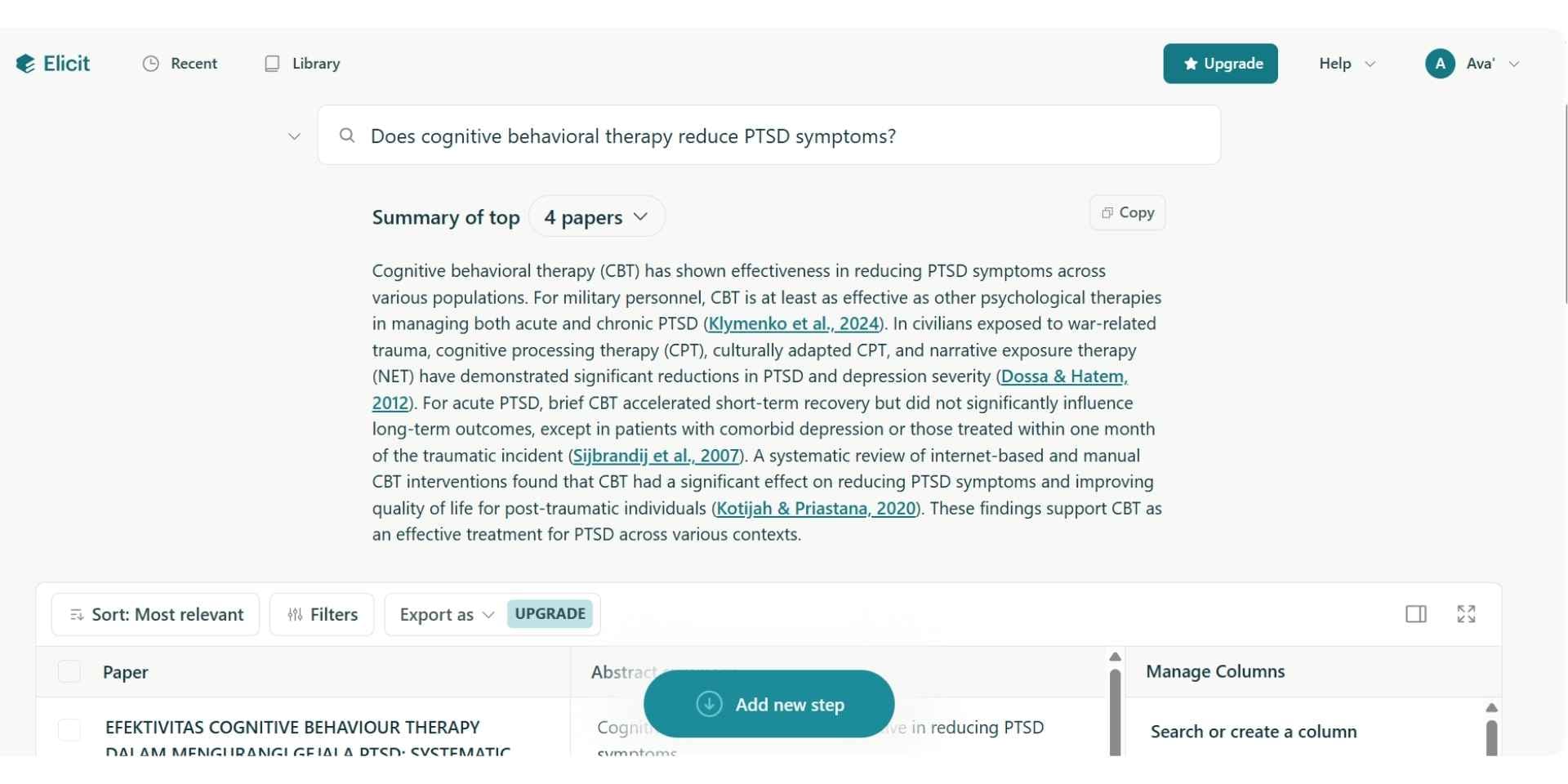
Elicit is an AI research assistant built for scientific research workflows, helping researchers conduct systematic reviews, extract data from papers, and analyse literature more quickly. By turning unstructured academic information into structured tables, it excels at scientific literature review, data extraction, and evidence synthesis.
Key Features
- Systematic Review Automation: Speeds up screening and synthesis by up to 80 percent
- Literature Q&A: Accepts natural-language questions and returns citation-backed answers
- Data Extraction: Pulls sample sizes, interventions, outcomes, and other variables from papers
- Custom Column Builder: Lets you tailor data tables to match your research framework
- Research Reports: Generates exportable summaries and syntheses in seconds
- PDF Upload and Analysis: Works on your own documents as well as papers found online
- Source Transparency: One click shows the exact text behind every citation
Best Use Case
Ideal for academic researchers, evidence-based policy professionals, and students who need AI support for systematic reviews, meta-analyses, and rapid literature data extraction.
Pricing
- Saves significant time on manual screening and synthesis
- Excellent citation-verified data extraction
- Purpose-built for systematic reviews and meta-analyses
Pros
- Ideal for scientific literature review and meta-analyses
- Excellent AI data extraction with source verification
- Saves significant time on manual screening and synthesis
Cons
- Requires some initial setup to optimise workflows
- Pro-tier pricing may be high for occasional users
Final Verdict
Elicit is the leading AI assistant for evidence synthesis and systematic reviews. Its automation cuts screening time dramatically, its transparent citations build trust, and its flexible credit-based plans make advanced literature analysis affordable for individual researchers and large teams alike.
4. Consensus
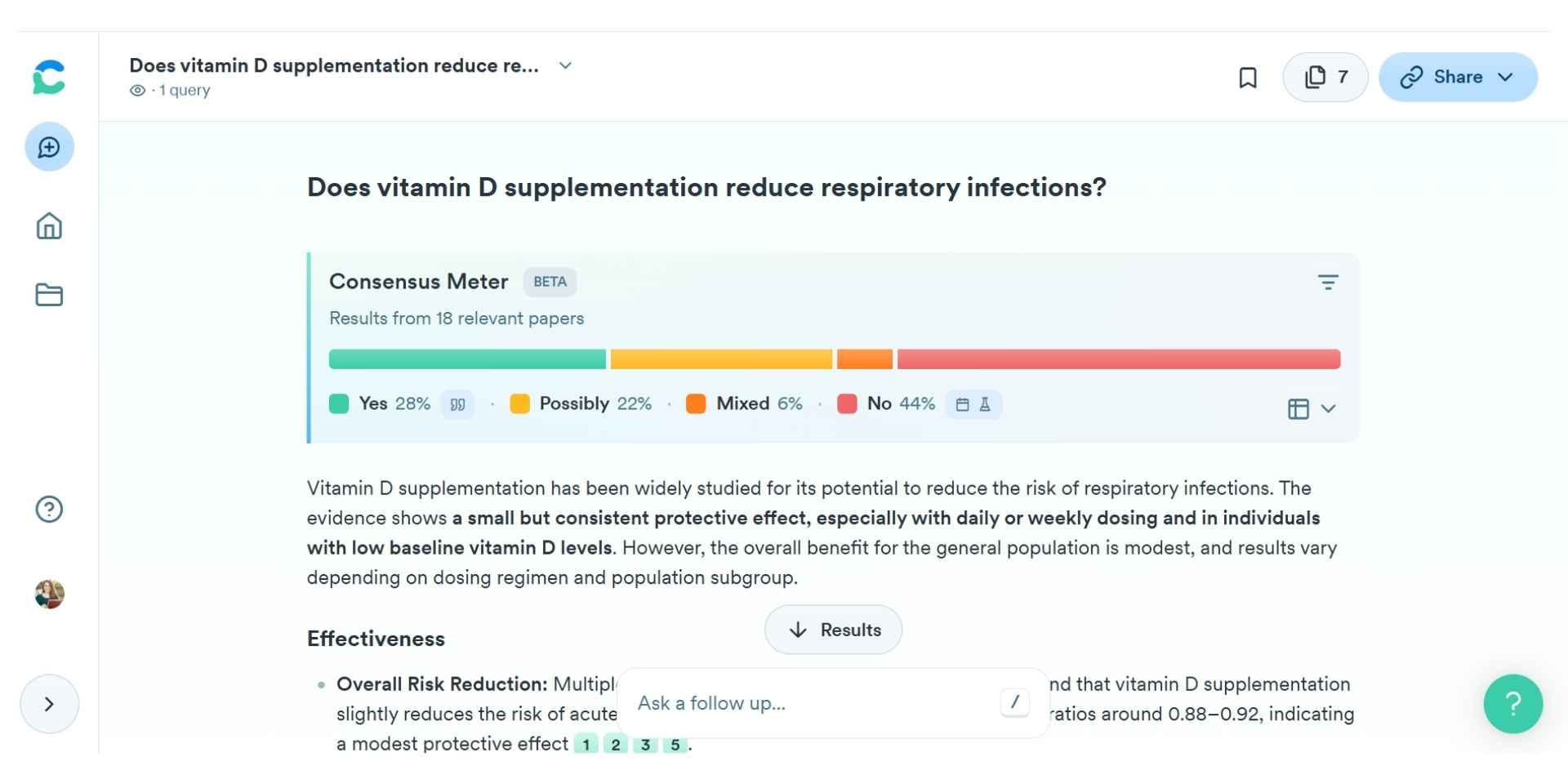
Consensus is an AI-powered tool built specifically for scientific research and literature review. It answers research questions by analyzing millions of peer-reviewed papers to identify the level of agreement among scientists. Unlike traditional search engines, Consensus prioritizes evidence-based answers and is especially useful for researchers, students, and professionals seeking reliable insights grounded in academic studies.
Key Features
- Consensus Meter: Visual indicator showing agreement levels across multiple studies
- Pro Analysis: AI-generated responses supported by citation-linked academic research
- Study Snapshots: Summarizes methodology, outcomes, and key findings
- Ask Paper: Chat-style interaction with individual papers for deeper understanding
- Advanced Filters: Refine by sample size, study design, and reported outcomes
- Multi-language Support: Search and read in over 100 languages
- GPT Store Integration: Available inside ChatGPT as “Consensus GPT”
- Research Quality Indicators: Highlights high-impact, peer-reviewed studies
Best Use Case
Ideal for evidence-based researchers, health professionals, and students who want fast, trustworthy answers to scientific questions. One of the most efficient AI tools for verifying claims, summarizing evidence, and exploring research consensus.
Pricing
- Free: 10 Pro Analyses, 10 Study Snapshots, and unlimited basic searches
- Premium: $11.99 per month or $107.88 per year
- Teams: $12.99 per user/month or $120 per user/year
- Enterprise: Custom pricing with integrations
- Student Discount: 40% off with academic email
Pros
- Clearly displays scientific consensus on complex topics
- Evidence-backed summaries with citation transparency
- GPT integration adds natural, conversational querying
- Simple interface with fast response times
Cons
- Limited depth for topics with little or conflicting research
- May simplify complex issues into binary consensus results
Final Verdict
Consensus is the best AI tool for identifying scientific agreement across studies. Its focus on evidence synthesis, real-time consensus scoring, and integration with GPT makes it ideal for researchers and professionals who need accurate, fast, and citation-supported answers without sifting through dozens of papers.
5. Scite
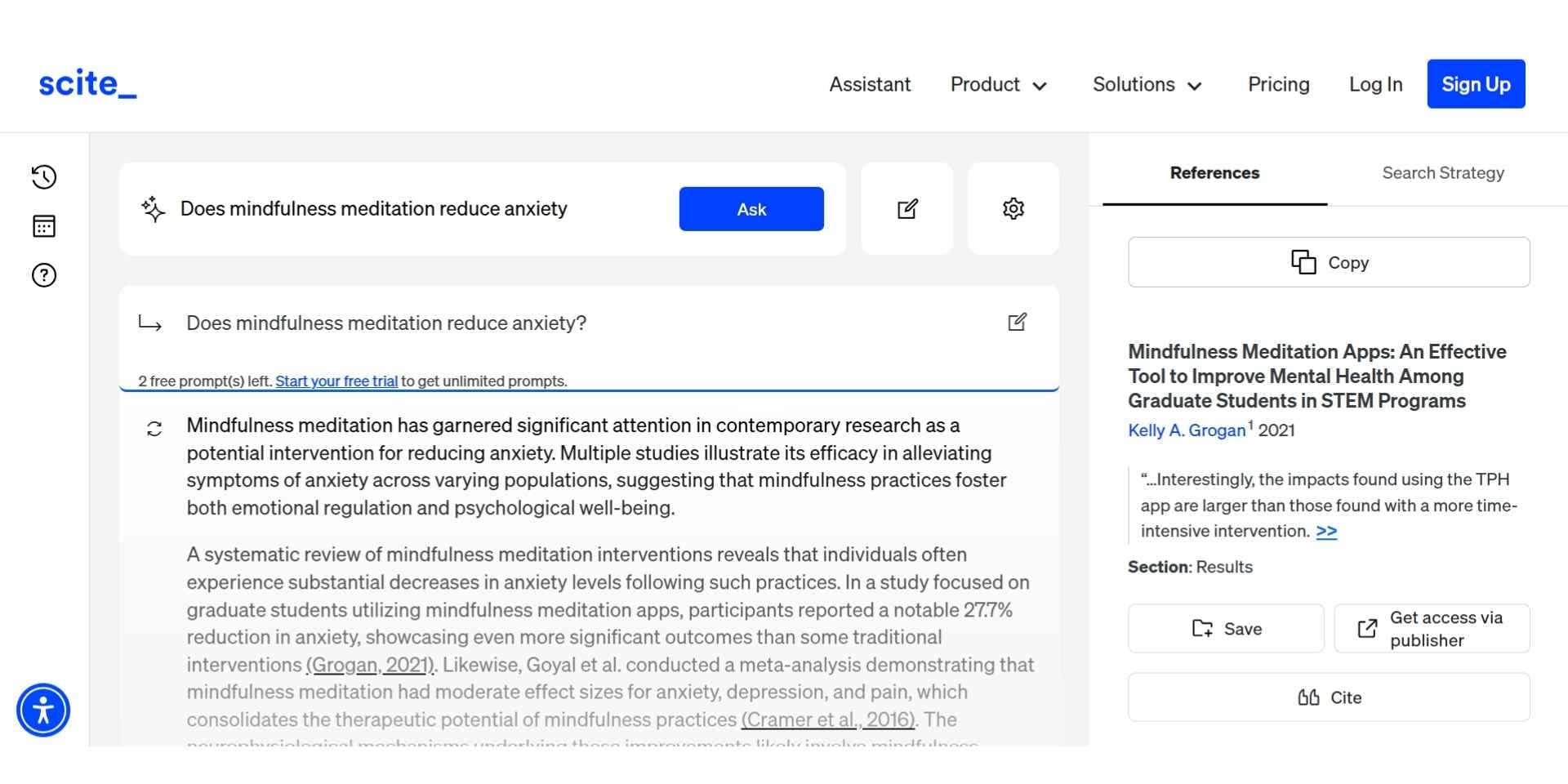
Scite is an AI-powered citation analysis platform purpose-built for scientific research. It offers much more than standard citation counts by showing how each paper is cited, whether it is supported, contradicted, or simply mentioned. This provides valuable insight into the credibility and relevance of scientific work, making Scite one of the most effective AI tools for scientific literature review and research validation.
Key Features
- Smart Citations: Labels citations based on whether they support, contrast with, or merely reference the cited work
- Citation Context: Shows the exact sentence or paragraph in which the citation appears
- AI Research Assistant: Answers questions using evidence from peer-reviewed literature
- Reference Check: Flags low-quality or retracted references in manuscripts
- Citation Visualizations: Displays interactive maps of research influence and ongoing debates
- Journal Metrics: Tracks citation behavior, impact scores, and topic trends across journals
- Dashboard Tools: Helps users monitor the quality and performance of their publications over time
- Browser Integration: Works with Zotero, Mendeley, and EndNote for seamless referencing
Best Use Case
Scite is ideal for researchers verifying the credibility of sources, especially during systematic reviews, meta-analyses, and manuscript preparation for high-impact journals. It is also well-suited for those learning how to write scientific papers that get published, by using strong, validated citations.
Pricing
- Free Trial: 7-day full access
- Individual: $12 per month or $144 per year
- Student: Discounted pricing available with academic email
- Organizations: Custom plans for teams, labs, and institutions
Pros
- Clearly distinguishes between supportive and critical citations
- Excellent for validating literature and understanding scientific debate
- Integrates smoothly with major reference management tools
Cons
- Coverage may vary in less-cited or emerging fields
- Pricing may be high for independent or early-career researchers
Final Verdict
Scite is the most advanced AI tool for citation quality analysis. Its smart citations, contextual insights, and integration with academic workflows make it essential for researchers focused on accuracy, transparency, and high-quality publication standards.
6. SciSpace
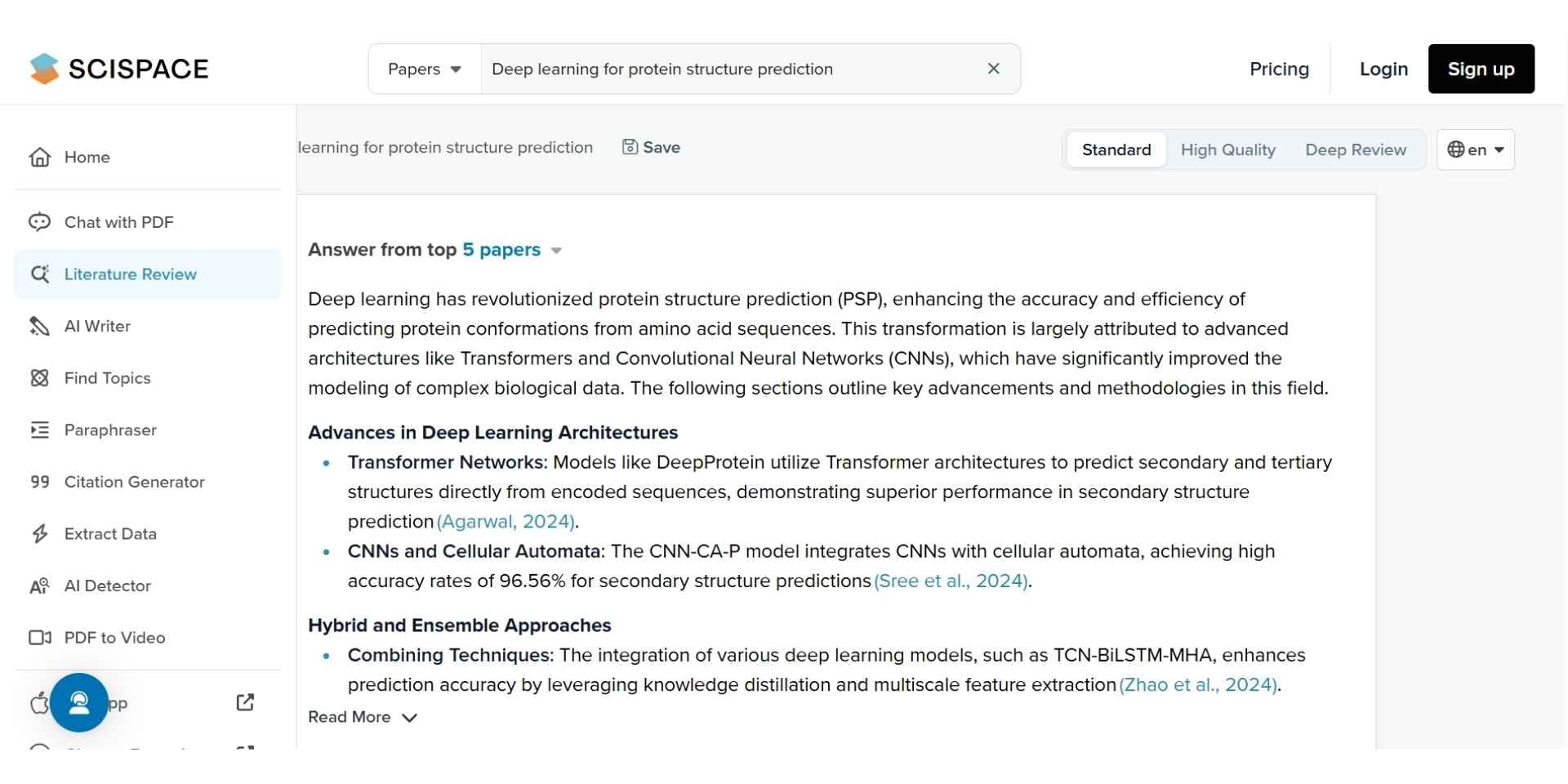
SciSpace is an AI-powered research platform that combines literature discovery, paper analysis, and academic writing assistance in one seamless interface. Formerly known as Typeset, SciSpace supports the entire scientific research process, from understanding complex PDFs to producing publication-ready content with properly formatted citations.
With both free and premium access, it is one of the most widely used AI tools for scientific research, especially among early-career researchers, students, and academics aiming to write and publish high-quality papers efficiently.
Key Features
- Copilot Chat: Ask questions about research papers and receive context-aware, citation-supported answers
- AI Literature Review: Extracts and compares information from multiple academic sources
- AI Writer: Generates academic content with references and proper structure
- Paraphraser: Rewrites text while maintaining scholarly tone and original meaning
- Citation Generator: Supports hundreds of academic styles for automated referencing
- AI Detector: Identifies AI-generated text to maintain academic integrity
- Chrome Extension: Provides assistance while browsing or reading papers online
- Export Formats: Includes RIS, BibTeX, CSV, Excel, and XML for easy integration
Best Use Case
Ideal for researchers who want an all-in-one platform to read, question, summarize, write, and cite scientific content. Especially helpful for those looking to simplify their workflow without switching between multiple tools.
Pricing
- Basic: Free access with limited features
- Premium: $12 per month with full feature access (discounted on annual plans)
- Advanced: $70 per month with Deep Review capabilities for literature synthesis
- Teams: Starts at $8 per user per month for shared tools and collaboration
Pros
- Unified platform for literature analysis, writing, and citation
- AI chat helps decode complex research PDFs
- Citation generator and paraphraser improve academic writing productivity
- Free tier includes enough features for basic research and review
Cons
- Advanced AI features are only available on higher-tier plans
- Some citation formatting can require manual adjustments for specific journals
Final Verdict
SciSpace is one of the most user-friendly AI tools for scientific research. With a strong free plan and a focus on academic integrity, writing assistance, and deep PDF interaction, it is perfect for researchers seeking an all-in-one solution for reading, writing, and citing scholarly content.
7. Julius AI
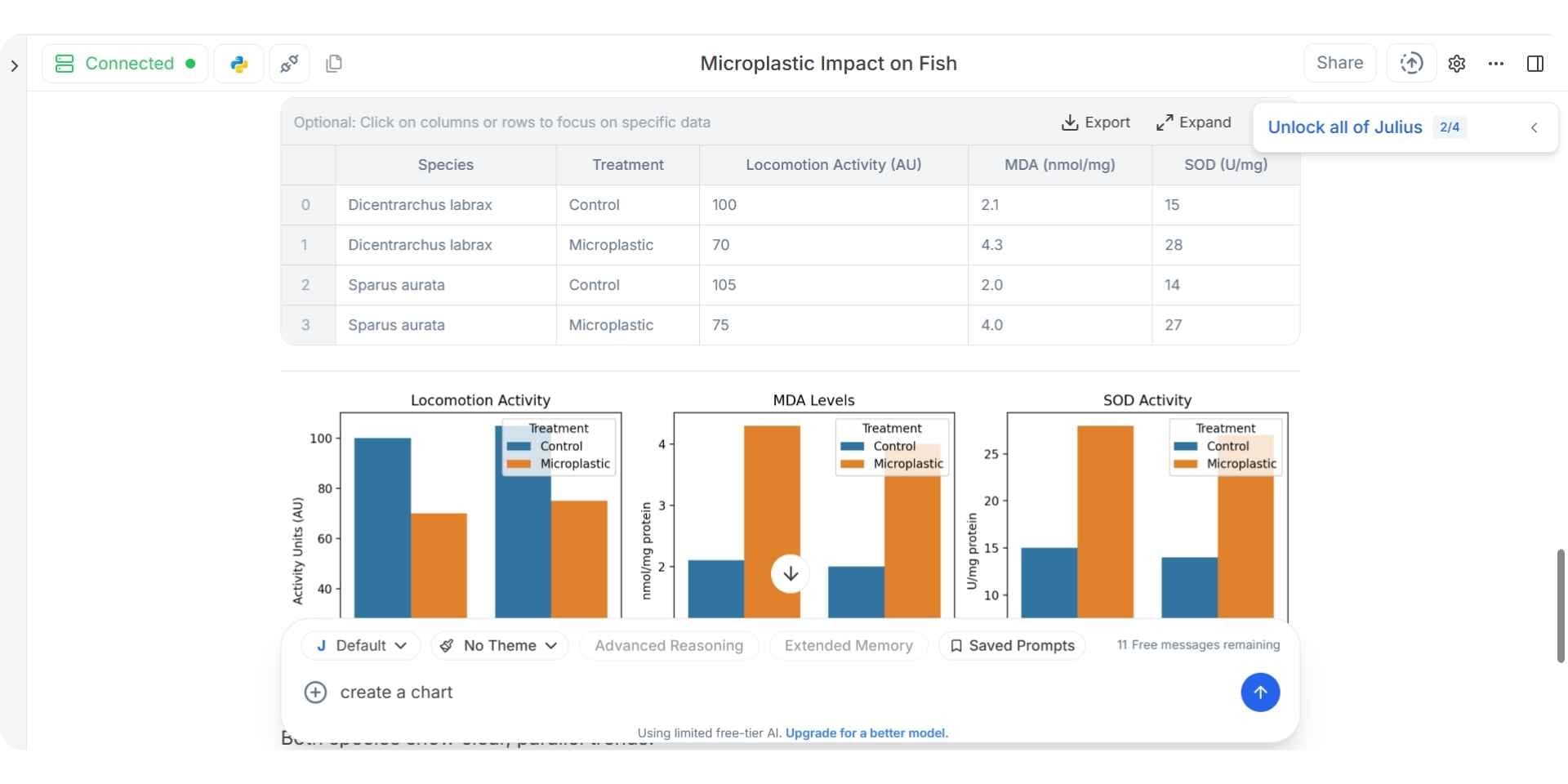
Julius AI is an AI-powered data analysis platform designed to help researchers explore and interpret datasets using natural language. It simplifies statistical analysis, data visualization, and scientific reporting, making it one of the best AI tools for data analysis and quantitative research in academic and scientific domains.
By removing the need for complex coding, Julius AI is especially useful for scientists, academic researchers, and students who want to focus on insights rather than programming syntax.
Key Features
- AI Model Access: Choose between GPT-4, Claude, and other high-performance language models
- File Support: Analyze data from formats including CSV, Excel, SPSS, and images
- Advanced Reasoning: Processes statistical queries and delivers in-depth interpretations
- Live Collaboration: Enables collaborative analysis in real time for teams
- Chart Builder: Creates visualizations with editable layouts and color schemes
- Data Integrations: Connects with platforms such as Google Drive, BigQuery, and Snowflake
- Notebook Mode: Allows users to document findings and research notes in one place
- Secure Infrastructure: SOC 2 compliant for privacy and enterprise-grade security
Best Use Case
Ideal for researchers handling large datasets in areas like behavioral science, public health, and economics. Suitable for creating publication-ready visuals, automating statistical workflows, and improving research productivity without coding.
Pricing
- Free: 15 messages per month, basic tools, 8 GB RAM
- Plus: $20 per month or $16.67 per month billed annually, with 250 messages and 16 GB RAM
- Pro: $45 per month or $37.50 per month billed annually, with unlimited use, 32 GB RAM, and team access
- Enterprise: Custom plan tailored for organizations requiring advanced infrastructure and support
Pros
- Enables no-code data analysis using natural language
- Supports multiple file types and scientific data formats
- Access to multiple AI models for deeper insight
- Real-time collaboration tools for research teams
Cons
- Not optimized for qualitative or text-heavy research workflows
- Most powerful features are locked behind paid plans
Final Verdict
Julius AI is one of the most accessible and powerful AI tools for scientific data analysis. With strong natural language capabilities, support for diverse file types, and collaborative features, it is ideal for researchers who need fast, reliable, and code-free insights across complex datasets.
8. Connected Papers
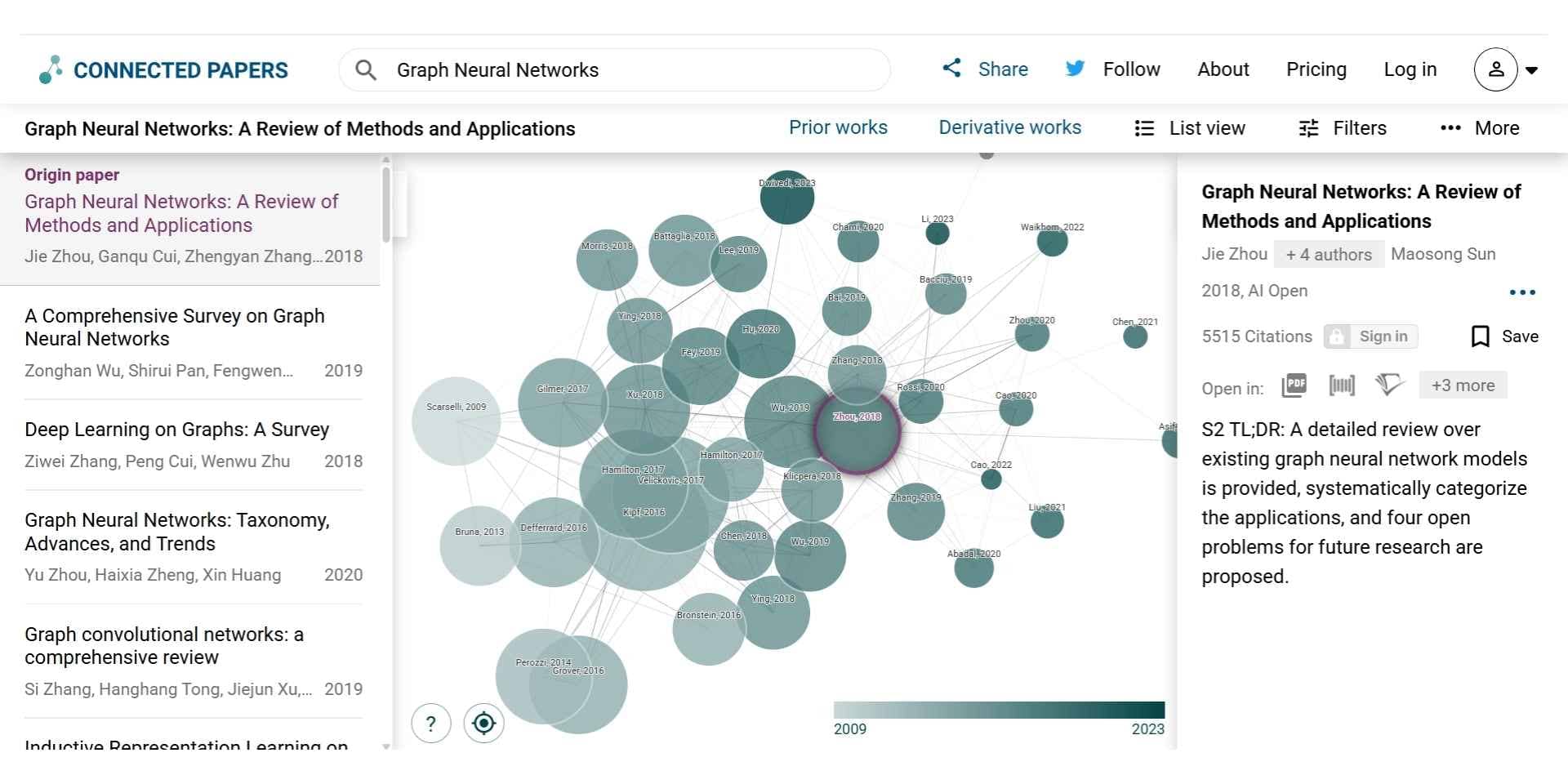
Connected Papers is a visual discovery platform that helps researchers understand the structure and progression of scientific literature. Rather than displaying results as a list, it builds interactive graphs that show how research papers relate to one another through citations and shared subject matter. This makes it especially useful for scientific literature review, topic exploration, and identifying both influential studies and underexplored areas.
By focusing on thematic similarity rather than raw citation count, Connected Papers stands out as one of the best AI tools for scientific research involving hypothesis formation, new topic exploration, or interdisciplinary mapping.
Key Features
- Visual Similarity Graphs: Displays networks of papers based on co-citation and bibliographic connections
- Prior and Derivative Works: Highlights both foundational research and newer developments
- Multi-Origin Graphs: Lets users compare and merge multiple topic areas
- Export Capabilities: Downloads bibliographies for use with reference managers
- Timeline View: Shows how a specific field or idea has evolved over time
- Collaborative Features: Allows sharing of research maps with team members
Best Use Case
Ideal for researchers entering new academic domains, performing topic mapping, or conducting early stage literature reviews. Especially useful for forming research questions or spotting emerging trends in scientific studies.
Pricing
- Free: Up to 5 graph visualizations per month with full access to features
- Premium: Custom pricing for unlimited use and access to advanced visual tools
Pros
- Unique interface for visualizing relationships between papers
- Great for exploring non-obvious research connections
- Easy to use and share with collaborators
- Supports early stage ideation and topic discovery
Cons
- Free plan has a low usage cap
- Not suited for detailed analysis or summarization of content
Final Verdict
Connected Papers is the best AI tool for visual literature mapping and research exploration in 2026. Its graph-based interface helps uncover hidden connections between studies, making it a powerful resource for researchers building new projects, entering unfamiliar fields, or generating novel academic hypotheses.
9. Research Rabbit
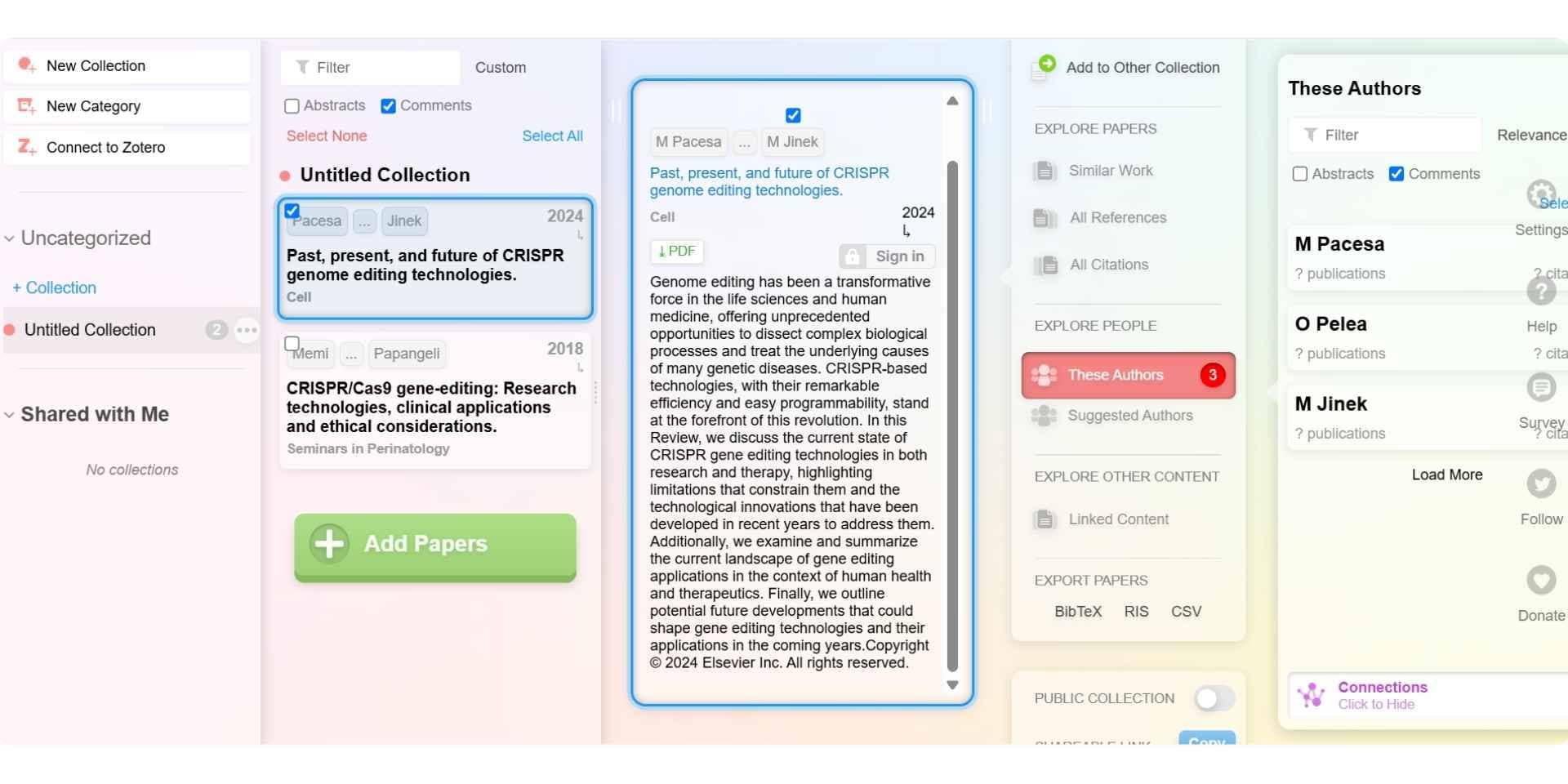
Research Rabbit is an AI-powered tool that simplifies discovering, organizing, and visualizing academic literature. It helps researchers explore related papers, track citations, and create research maps. By leveraging citation networks and AI algorithms, it accelerates the literature review process and aids in understanding how studies connect and evolve over time.
Key Features
- Visual Network Mapping: Explores relationships between studies through interactive research graphs
- Citation Chaining: Navigates both forward and backward citations to trace how ideas evolve over time
- Author Networks: Identifies collaborative links and influence between researchers
- Personalized Recommendations: AI suggests relevant papers based on your saved collections
- Timeline View: Visualizes the chronological development of a research topic
- Collection Management: Organizes papers by theme, project, or research goal
- Zotero Integration: Syncs directly with your reference manager for streamlined workflow
- Team Collaboration: Enables shared research collections and real-time collaboration
Best Use Case
Perfect for researchers conducting literature reviews or entering unfamiliar academic fields. It is one of the best free AI tools for scientific research when the goal is to discover lesser-known papers and visualize their academic context.
Pricing
- Free Forever: All core features available without limits or subscription fees
Pros
- Completely free to use with no hidden restrictions
- Exceptional for uncovering connections between papers and authors
- User-friendly and visual, especially for early-stage research exploration
Cons
- Uses Microsoft Academic Graph, which has not been updated since 2021
- Does not offer content summarization or deep analysis capabilities
Final Verdict
ResearchRabbit is the best free AI tool for visual literature discovery and citation mapping. Its ability to uncover overlooked studies and explore author networks makes it an ideal choice for researchers who want to build a deep understanding of any scientific field from the ground up.
10. Scholarcy
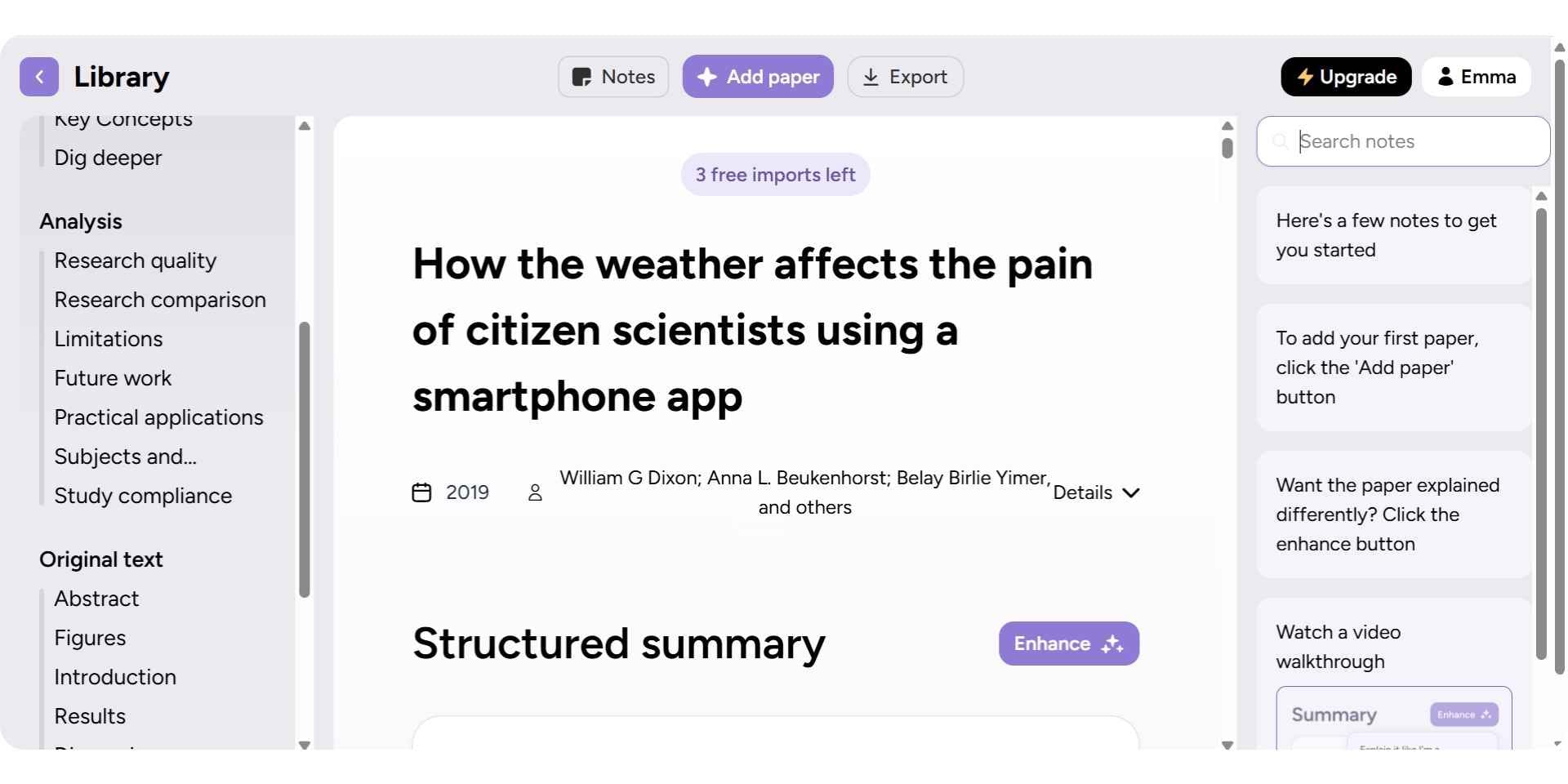
Scholarcy is an AI-powered assistant that accelerates reading and comprehension of research papers. It converts lengthy PDFs into structured, easy-to-scan summaries, extracting key points, tables, and references in minutes. For anyone handling large literature sets, Scholarcy is one of the most convenient AI tools for scientific literature review and an accessible free AI tool for scientific research via its browser extension.
Key Features
- Automated Summaries: Converts full papers into concise flashcards and sectioned overviews
- Robo-Highlighter: Identifies and flags each paper’s main findings and contributions
- Table and Figure Extraction: Grabs visual data for quick inspection and reuse
- Customisable Summaries: Lets users set detail level and length to match their needs
- Browser Extension: Summarises papers instantly while you browse online databases
- Citation Extraction: Pulls reference lists and formats them automatically
- Collaboration Tools: Enables sharing and annotation of summaries with colleagues
Best Use Case
Ideal for rapid literature reviews, large-scale paper screening, and evidence synthesis. Especially helpful during early scoping stages when researchers need to absorb core ideas and data quickly.
Pricing
- Free Browser extension with basic summarisation
- Scholarcy Library $9.99 per month or $90 per year for full feature set
- Institutional Access From $8 000 per year for department-wide deployment
Pros
- Dramatically shortens time spent evaluating extensive literature
- Customisable output formats suit a variety of research workflows
- Browser integration delivers real-time summaries inside databases
- Extracts tables and figures to speed up data review
Cons
- May miss nuanced arguments or deep critical analysis
- Less suited to researchers who require full-text, line-by-line evaluation
Final Verdict
Scholarcy is the top AI tool for rapid paper summarisation. Its flashcard-style outputs, table extraction, and low-cost browser add-on make it indispensable for researchers who must screen and digest large numbers of studies without compromising on accuracy.
11. Iris AI
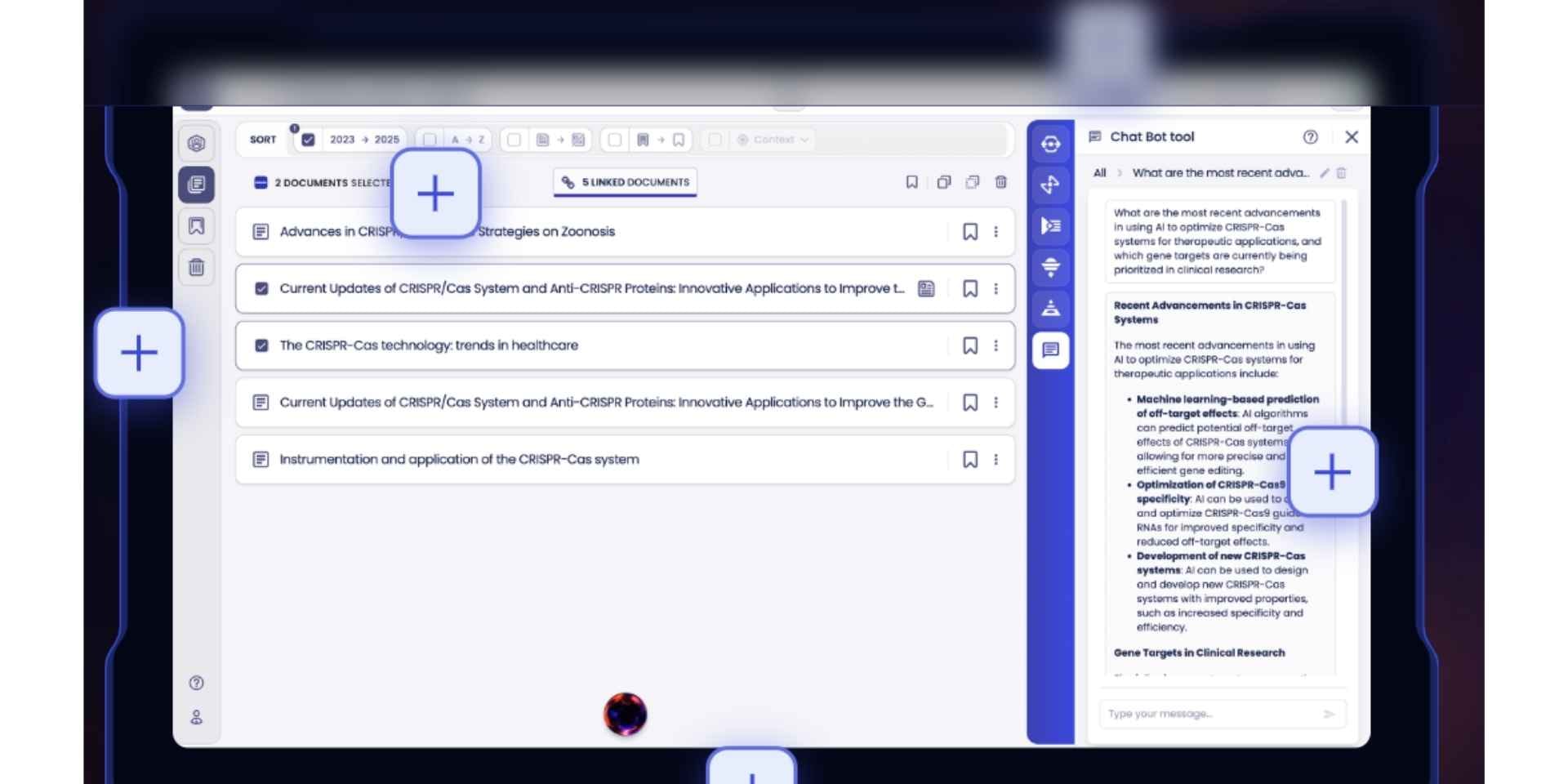
Iris AI is a powerful platform for scientific concept mapping and literature analysis. Built for complex interdisciplinary research, it enables researchers to explore, visualize, and interpret relationships between scientific ideas. With advanced scientific text understanding, Iris AI supports literature discovery, structured data extraction, and cross-domain research synthesis at scale.
This tool is especially valuable for large-scale teams and institutions that need AI tools for scientific research involving technical content, diverse datasets, and high-level knowledge mapping.
Key Features
- Scientific Text Understanding: Applies AI to interpret and process academic language with precision
- Smart Search: Performs concept-based searches across large scientific databases
- Automated Literature Reviews: Synthesises findings from hundreds of papers into meaningful outputs
- Data Extraction: Structures quantitative and qualitative insights from full-text research
- Concept Mapping: Creates visual maps of how topics, terms, and studies are connected
- Reading List Analysis: Clusters related papers and highlights gaps or overlaps
- Chatbot with References: Offers interactive research support with citation-backed responses
Best Use Case
Ideal for enterprise research teams, R&D departments, and academic institutions dealing with interdisciplinary research. Iris AI excels in situations that demand deep scientific literature review, large-scale data analysis, or high-level conceptual exploration across domains.
Pricing
- Custom Quote: Enterprise pricing based on organization needs
- Individual License: Previously offered at approximately €70 per month
Pros
- Advanced AI designed specifically for research concept exploration
- Effective for structured reviews and cross-field knowledge analysis
- Strong support for institutional and collaborative research environments
- Enterprise-ready infrastructure and data compliance
Cons
- Pricing model may be inaccessible for individual researchers or small teams
Final Verdict
Iris AI is the most advanced AI tool for scientific concept mapping and interdisciplinary research. With enterprise-grade features for synthesis, search, and data interpretation, it is ideal for institutions tackling complex research questions across multiple domains.
12. Zotero
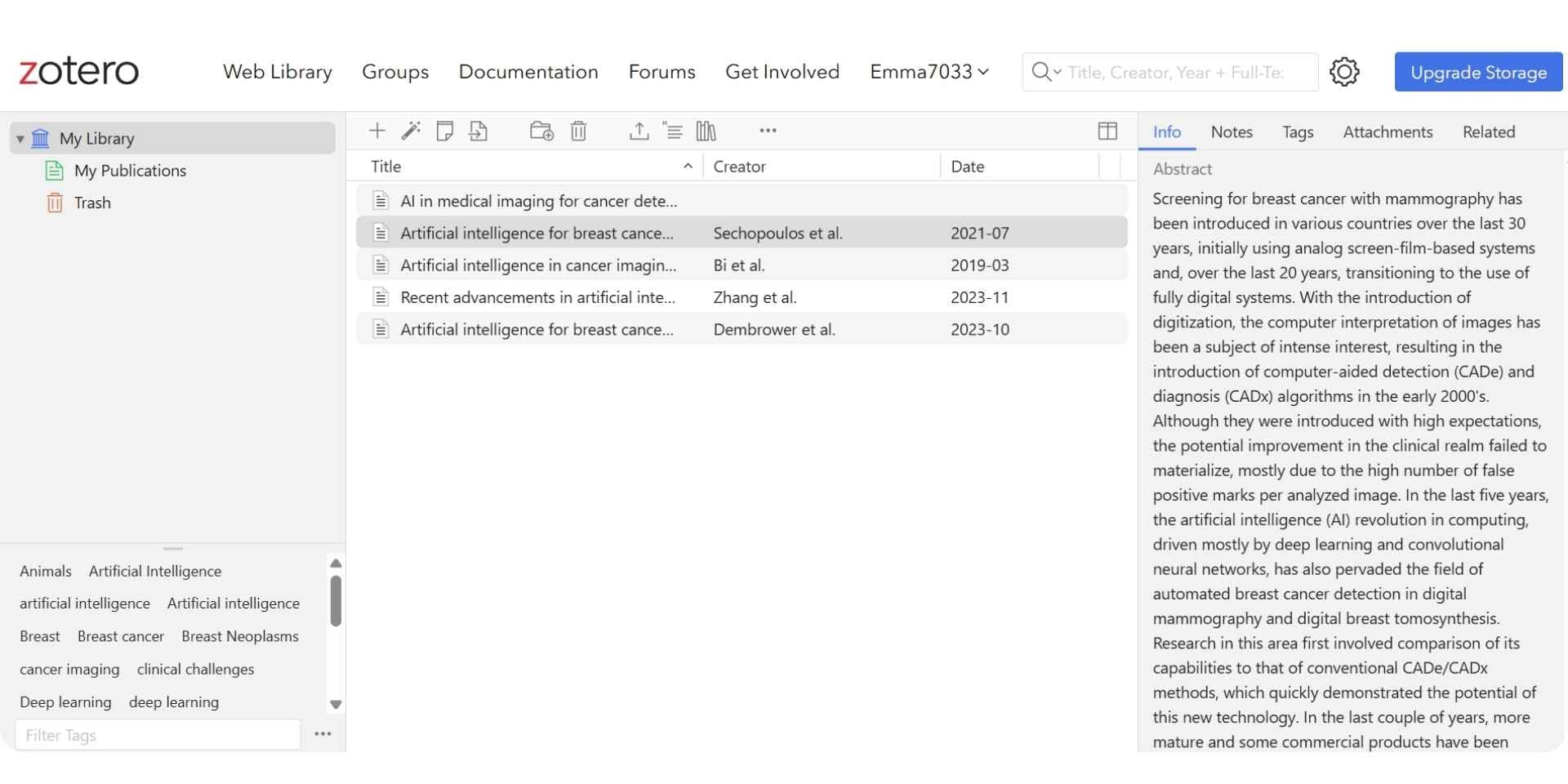
Zotero is a widely used open-source reference manager trusted by researchers around the world. Although it does not use AI, Zotero plays a central role in academic and scientific research by helping users organize sources, create citations, annotate PDFs, and collaborate with teams. Its compatibility with thousands of citation formats makes it an essential tool for anyone managing bibliographies or preparing manuscripts for publication.
For those using AI tools for scientific research writing, Zotero integrates smoothly with writing environments and boosts overall research productivity through its organization and citation management features.
Key Features
- One-Click Reference Saving: Captures citations directly from research databases, websites, and academic papers
- Over 9 000 Citation Styles: Supports virtually all major academic journals and formatting guidelines
- Word Processor Integration: Inserts in-text citations and builds bibliographies in Word and Google Docs
- PDF Annotation: Allows researchers to highlight, comment, and organize notes within their documents
- Group Collaboration: Enables sharing of research libraries with colleagues and collaborators
- Cloud Sync: Keeps your reference library updated across multiple devices
- Mobile Access: Offers iOS and Android apps for research on the move
Best Use Case
Ideal for students, researchers, and academic writers who need a reliable and free reference manager. It pairs especially well with AI tools for scientific research writing, providing the citation infrastructure that AI tools often lack.
Pricing
- Free: Includes full functionality with 300 MB of cloud storage
- Paid Plans: $20 per year for 2 GB, $60 per year for 6 GB, or $120 per year for unlimited storage
Pros
- Free and open-source with robust core features
- Strong integration with word processors and writing platforms
- Supports a wide range of citation styles and file types
- Excellent for managing complex or high-volume scientific bibliographies
Cons
- Lacks built-in AI features for summarising or analysing content
- Interface may feel less modern compared to newer AI-first tools
Final Verdict
Zotero remains the best non-AI reference management tool for researchers. When paired with AI writing assistants, it provides the structure and precision needed for citation-heavy scientific research, making it an indispensable part of any academic workflow.
13. EndNote
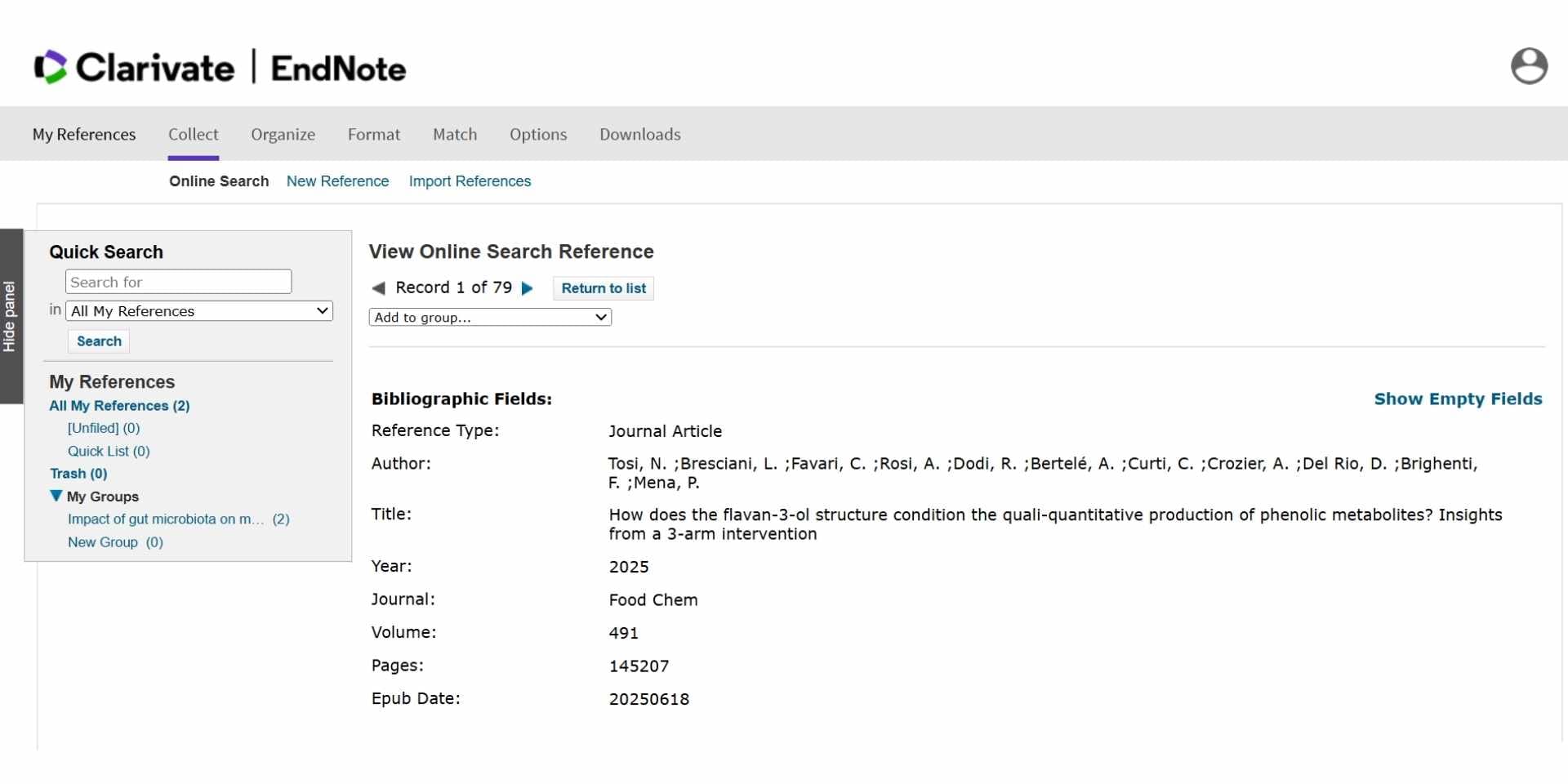
EndNote is a long-standing reference manager that now includes AI-assisted features in its 2026 release. Known for precise citation formatting and robust reference organisation, it adds intelligent paper summaries and journal-matching tools, making it one of the most complete AI-enhanced solutions for scientific research writing and manuscript preparation.
EndNote is particularly valuable for researchers aiming to publish in high-impact journals, manage large reference libraries, and monitor retracted literature.
Key Features
- AI Key Takeaway: Generates concise summaries of individual research papers
- Find a Journal: Uses AI to match manuscripts with suitable journals and impact factors
- Cite from PDF: Creates citations directly from highlighted text in full-text PDFs
- Unlimited Storage: Stores unlimited references and attachments in the cloud
- Web of Science Integration: Connects to a trusted research database for seamless importing
- Manuscript Matcher: Suggests journals that align with your study’s scope and impact goals
- Collaboration Tools: Share reference libraries with up to 1 000 collaborators
- Retraction Alerts: Notifies users when cited articles are retracted
Best Use Case
Ideal for researchers, universities, and labs preparing journal-ready manuscripts or managing extensive reference libraries. Especially useful for improving scientific research publishing impact factor by selecting the right journal and ensuring citation accuracy.
Pricing
- Full License: $319 one-time
- Upgrade License: $145 for existing users
- Student License: $174 with valid academic ID
- Institutional Access: Custom pricing available
Pros
- Comprehensive reference and manuscript tools in one platform
- AI features streamline journal targeting and paper summarisation
- Deep integration with Web of Science and other academic resources
- Unlimited storage plus large-scale collaboration support
Cons
- Significantly higher cost than most free or open-source alternatives
- Steeper learning curve for first-time users
Final Verdict
EndNote is the most feature-rich AI-enabled reference manager for scientific publishing. With advanced journal recommendations, retraction alerts, and unlimited storage, it offers a premium solution for researchers who need absolute accuracy and strategic journal placement to get their papers published quickly and with maximum impact.
14. Mendeley
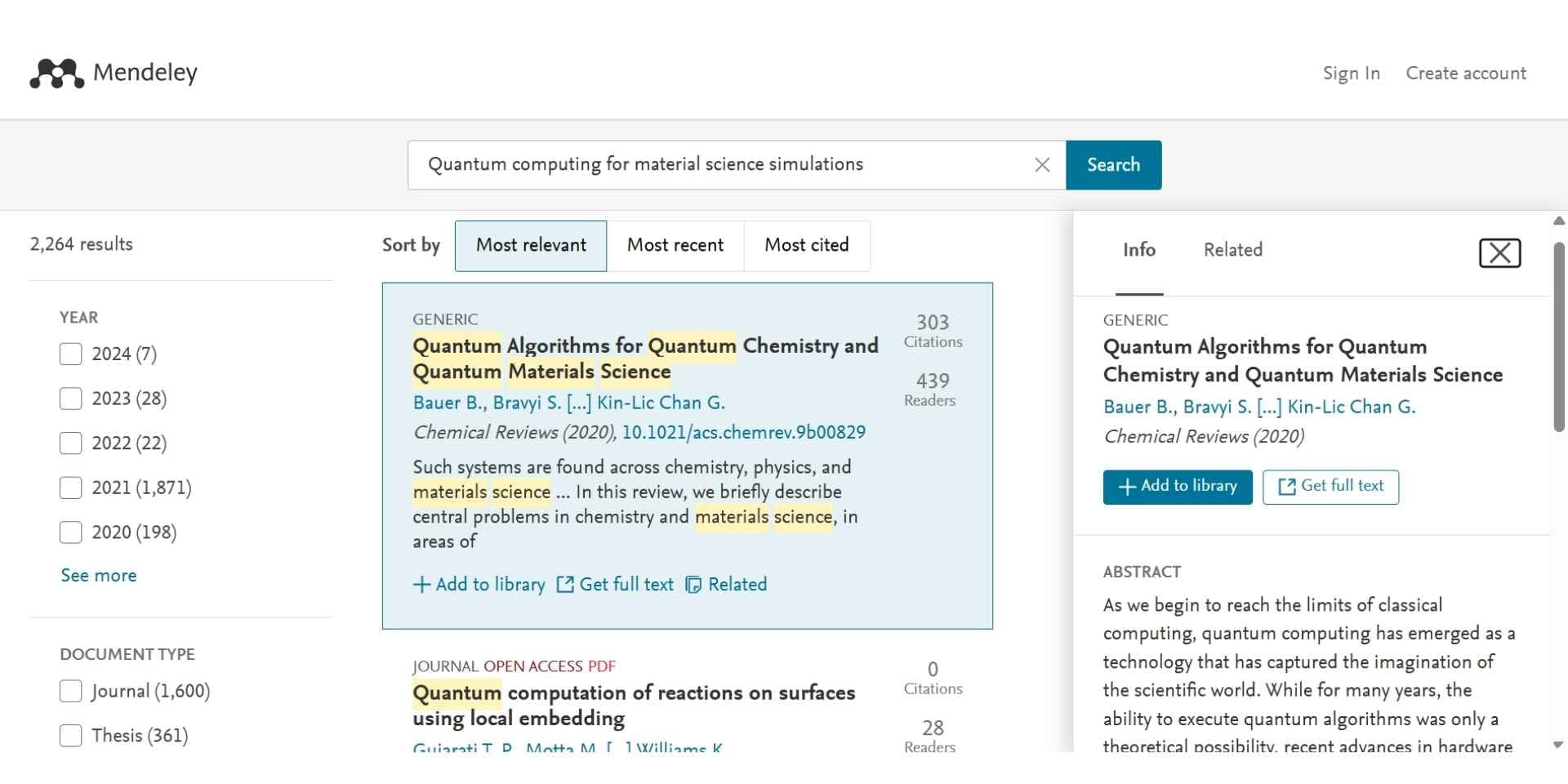
Mendeley is a research collaboration platform that combines citation management with academic networking. Although it does not include built-in AI, it is widely used for organising references, annotating PDFs, and discovering new studies through social recommendations. By streamlining how researchers collect, manage, and share academic papers, Mendeley boosts productivity for teams and early-career scientists.
Key Features
- Reference Management: Organises and cites scientific sources with ease
- PDF Annotation: Highlights passages and adds notes with automatic cloud sync
- Social Discovery: Recommends trending papers from your academic network
- Collaboration Groups: Shares documents and ideas in private team spaces
- Reading Analytics: Tracks how often your papers are read and saved
- Citation Formatting: Supports thousands of journal styles for instant formatting
- Web Importer: Saves references directly from the browser
- Mobile Access: Full-featured apps for Android and iOS
Best Use Case
Ideal for graduate students, research groups, and collaborative projects that require both reference management and academic networking.
Pricing
- Free: 2 GB cloud storage, 5 private groups (25 members each), 100 MB shared space
- Plus: $4.99 per month or $55 per year for 5 GB storage
- Pro: $9.99 per month or $110 per year for 10 GB storage
- Max: $14.99 per month or $165 per year for 100 GB storage
Pros
- Integrates citation management with research-network features
- Cloud sync of annotated PDFs across devices
- Strong mobile apps that support research while travelling
- Facilitates collaboration across laboratories and institutions
Cons
- No AI-powered discovery, summarisation, or writing tools
- Interface can feel cluttered to new users
- Some advanced storage and collaboration options require a paid plan
Final Verdict
Mendeley remains the top free reference manager for researchers who value collaboration and social discovery . Its blend of citation tools, cloud annotation, and academic networking makes it a solid companion to AI writing assistants, rounding out an efficient and connected scientific workflow.
15. Labster
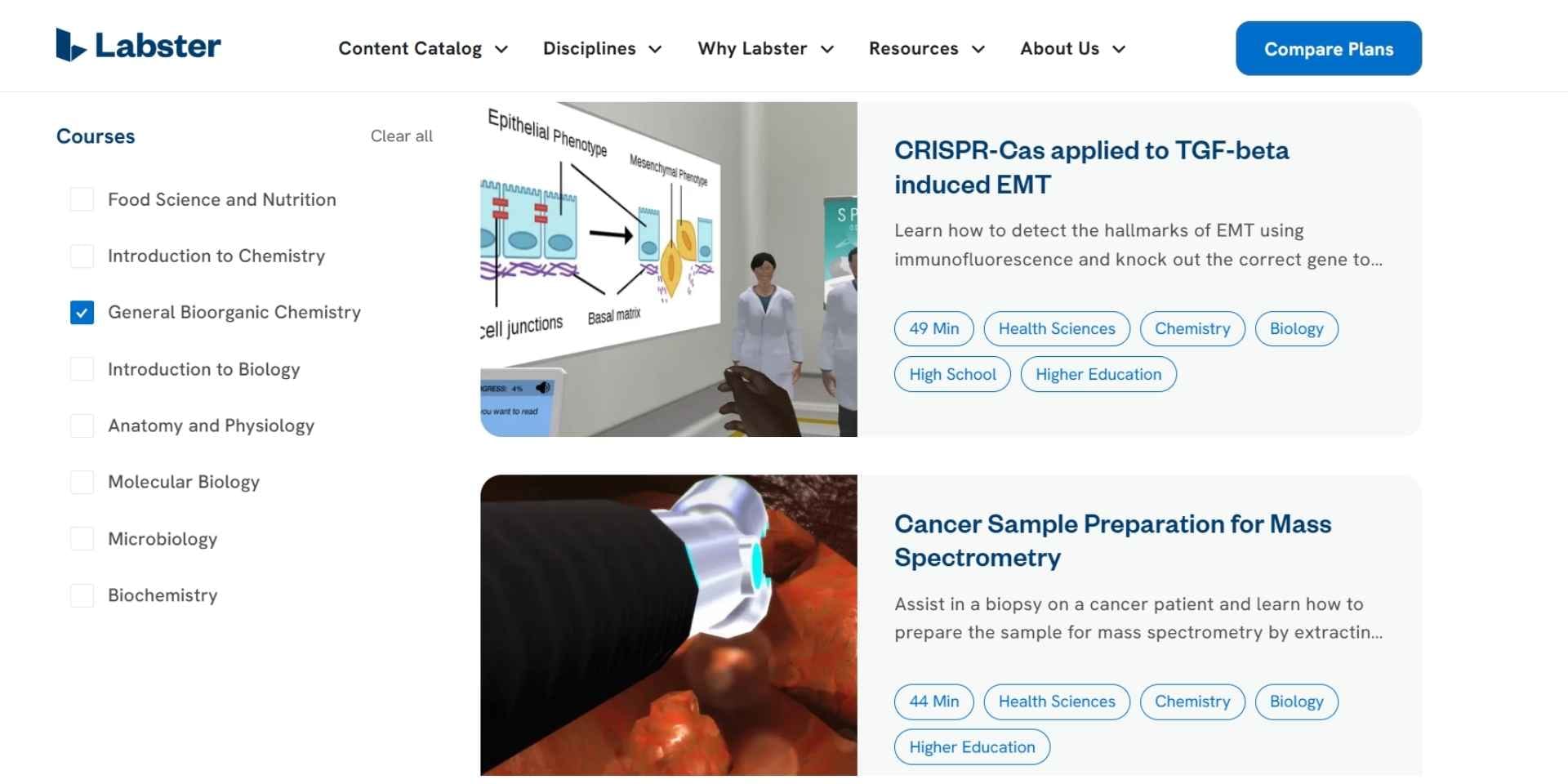
Labster brings scientific research training into the digital era through immersive 3D virtual lab simulations. Although originally developed for education, it is increasingly used in research institutions for scientific methodology training and lab-based skill development. With gamified modules and realistic experimental environments, Labster serves as a valuable AI-powered platform for learning scientific research methods and improving lab productivity.
Key Features
- Over 300 Virtual Labs: Covers biology, chemistry, physics, and engineering disciplines
- 3D Immersive Lab Environment: Simulates equipment handling and experimental workflows
- VR Compatibility: Supports virtual reality headsets for fully immersive learning
- Gamified Learning: Engages users with scenario-based missions and interactive challenges
- **Built-in Assessments:**Includes quizzes and progress tracking for learners
- LMS Integration: Compatible with platforms like Canvas and Moodle
- Collaborative Experiments: Allows group-based simulations and peer learning
- Safety-First Training: Ideal for practicing hazardous techniques in a risk-free setting
Best Use Case
Perfect for universities, research labs, and STEM educators delivering research method training or onboarding students into experimental design and lab protocols without requiring physical lab access.
Pricing
- Labster Explorer: $8.33 per student per month for 50 users and 10 simulations (billed annually)
- Labster Advanced: Custom pricing for 30 or more simulations
- Labster Elite: Enterprise-level access to all simulations with premium support
Pros
- Offers realistic virtual training for scientific research methods
- Ideal for remote learning, onboarding, and early-stage research skill-building
- Scalable and safe alternative to in-person lab training
Cons
- Cannot fully replicate hands-on lab experience
- Pricing may be restrictive for smaller institutions or individual learners
Final Verdict
Labster is the best AI-powered tool for scientific research method training and virtual lab simulation. Its immersive environments, curriculum integration, and broad scientific scope make it a top choice for academic programs and research teams focused on scalable, safe, and effective lab education.
16. MATLAB
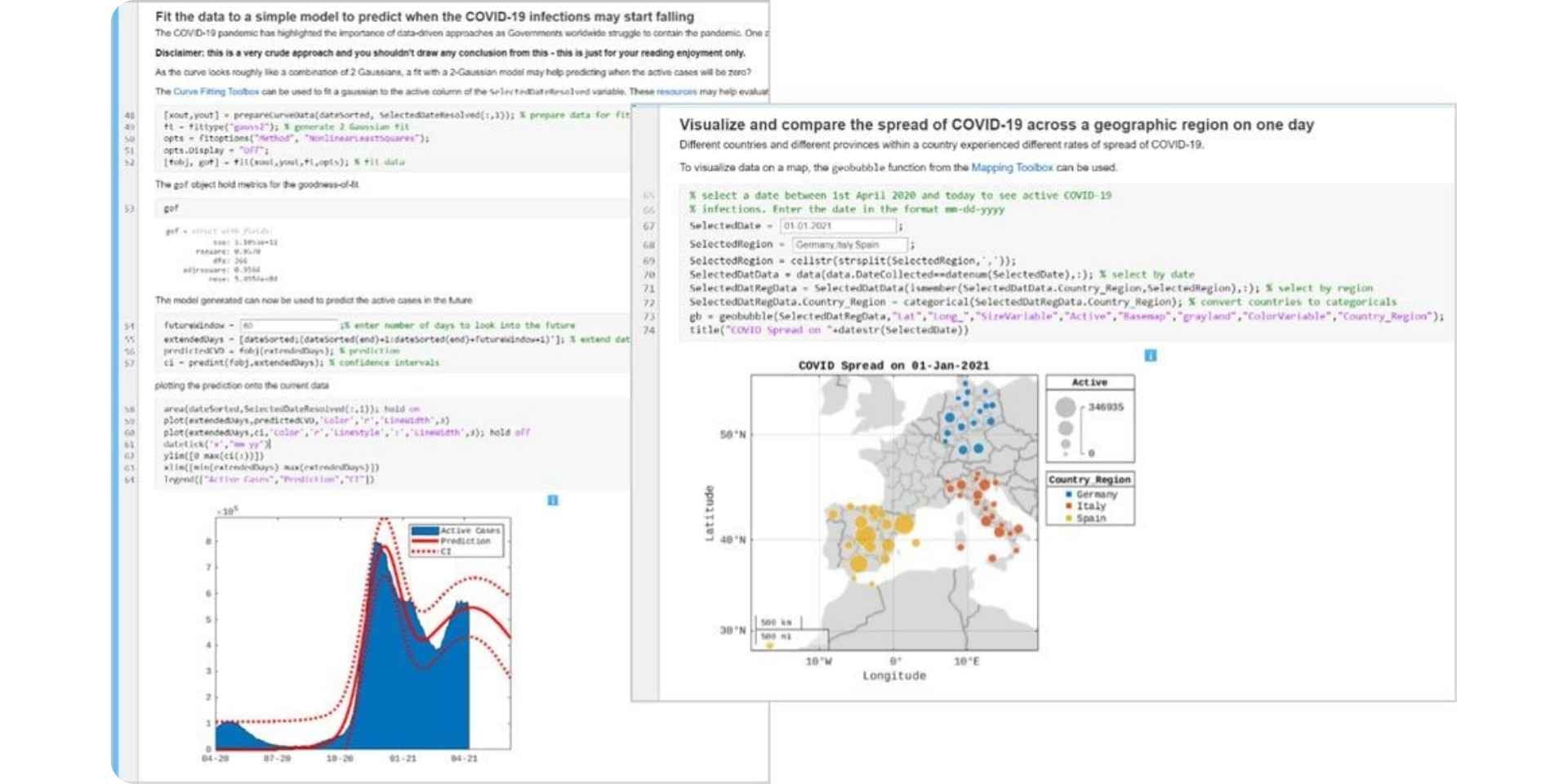
MATLAB is a powerful scientific computing platform used extensively in academic and industrial research. While not specifically an AI tool, it supports advanced data analysis, quantitative modeling, machine learning, and simulation. These capabilities make it highly valuable for scientific research involving engineering systems, biomedical signal processing, or large-scale numerical computation.
Key Features
- Mathematical Modeling: Solves complex equations and runs simulations with high precision
- Data Visualization: Generates advanced plots and interactive visual data displays
- Machine Learning Toolbox: Supports model training, evaluation, and deployment
- Signal and Image Processing: Processes scientific data, time series, and medical images
- Parallel Computing: Accelerates workflows using multicore and GPU resources
- Live Scripts: Combines code, output, and formatted notes in one environment
- **Specialised Toolboxes:**Provides research tools for engineering, physics, biology, finance, and other disciplines
Best Use Case
Best suited for researchers who need high-performance computing, scientific modeling, or AI-supported workflows in fields like applied mathematics, physics, or biomedical engineering.
Pricing
- Individual Annual Licence: $860
- Individual Perpetual Licence: $2,150
- Academic Plans: Discounted options for faculty and students
- Home Use: Lower-cost licence for personal, non-commercial research
- Campus-Wide Licence: Custom pricing for institutional access
Pros
- Widely trusted for scientific computing and modeling
- Large library of specialised research toolkits
- Strong capabilities in machine learning and data analysis
- Ideal for high-level quantitative research across disciplines
Cons
- Cost may be prohibitive for individual researchers
- Steeper learning curve compared to simpler platforms
Final Verdict
MATLAB is the most powerful scientific computing tool for advanced modeling and data analysis in 2026. With deep support for machine learning, signal processing, and domain-specific research, it is an essential platform for researchers handling complex scientific challenges and large datasets.
How to Choose the Best AI Tools for Scientific Research in 2026
With a wide range of AI-powered tools available, selecting the right one depends on your research goals, workflow preferences, and academic requirements. Here are key factors to consider when evaluating tools for scientific research:
- For writing scientific papers that get published: Use Paperguide, Scite, or SciSpace for citation-supported, publication-ready content creation
- For systematic reviews and meta-analyses: Paperguide and SciSpace offer structured data extraction and synthesis workflows
- For visual literature discovery: Explore Connected Papers or ResearchRabbit to map connections and topic evolution
- For reference management: Zotero, Mendeley, and Paperguide are dependable citation tools for manuscript preparation
- For data-heavy analysis: Use Julius AI or MATLAB for managing large datasets and advanced modeling
- For quick summaries and literature screening: Try Scholarcy or Semantic Scholar for instant insights
- For immersive scientific training: Labster offers simulation-based learning for lab method training
These tools are helpful for both beginners in scientific research and professionals conducting high-level academic work. Whether you're performing a literature review or learning how to write scientific papers that get published, there is a tool to match your needs. For an overview of quantitative and qualitative research methods, Paperguide provides detailed guidance.
Final Comparison of Top AI Tools for Scientific Research in 2026
| Tool | Literature Review | Meta Analysis | Systematic Review | Writing Support | Citation Management | Pricing |
|---|---|---|---|---|---|---|
| Paperguide | ✅ | ✅ | ✅ | ✅ | ✅ | Free, $12–$24 |
| Semantic Scholar | ✅ | ❌ | ❌ | ❌ | Partial | Free |
| Elicit | ✅ | ✅ | ✅ | ❌ | ❌ | Free, $12–$42 |
| Consensus | Partial | ❌ | ❌ | ✅ | ❌ | Free, $11.99 |
| Scite | Partial | ❌ | ❌ | ❌ | ✅ | Trial, $12+ |
| SciSpace | ✅ | ✅ | ❌ | ✅ | ✅ | Free, $12–$70 |
| Julius AI | ❌ | ❌ | ❌ | ❌ | ❌ | Free, $20–$45 |
| Connected Papers | ❌ | ❌ | ❌ | ❌ | ❌ | Free |
| ResearchRabbit | ❌ | ❌ | ❌ | ❌ | Partial | Free |
| Scholarcy | ✅ | ✅ | ❌ | ✅ | ❌ | Free, $10+ |
| Iris AI | ✅ | ✅ | ✅ | ✅ | ❌ | Contact Sales |
| Zotero | ❌ | ❌ | ❌ | ❌ | ✅ | Free |
| EndNote | ❌ | ❌ | ❌ | ❌ | ✅ | ₹14,944+ |
| Mendeley | ❌ | ❌ | ❌ | ❌ | ✅ | $5–$15 |
| Labster | ❌ | ❌ | ❌ | ❌ | ❌ | $8.33+/student |
| MATLAB | ❌ | ❌ | ❌ | ❌ | ❌ | $860/year |
Why Paperguide Is the Best AI Tool for Scientific Research in 2026
After hands-on testing and cross-comparison, Paperguide stands out as the best AI research tool for scientific research in 2026.
Comprehensive Research Coverage
Paperguide supports every phase of the scientific research workflow. From literature search and Deep Research reporting to AI-assisted manuscript writing, it covers end-to-end needs with speed and structure.
Exceptional Value Proposition
Its generous free plan, including 2 Deep Research reports per month, and affordable upgrade tiers make it accessible for students, independent researchers, and faculty alike.
Research Integrity Focus
Every AI response includes source citations and transparent referencing. This is essential for academic credibility and supports compliance with journal publishing standards.
Seamless Integration
Paperguide integrates with tools researchers already use, such as Zotero and BibTeX, while supporting standard file formats like PDFs and CSVs.
Continuous Innovation
Paperguide is also ranked among the best scientific documentation tools. It offers structured research organization and AI-powered writing assistance for researchers. The platform continues to evolve through user feedback, consistently adding new features aligned with academic needs.
Conclusion
AI tools are no longer optional. They are now essential in modern scientific research. When used correctly, they help researchers save time, improve accuracy, and focus on what truly matters: producing original, impactful work.
Instead of searching for one perfect tool, combine options that complement each other. For example, use ResearchRabbit for discovery, Paperguide for writing and analysis, and Zotero for managing citations.
Start with free plans, test their fit with your workflow, and upgrade only when the added value is clear. The future of research lies in the collaboration between human insight and AI support. These tools are here to extend your capabilities, not replace them, helping you push scientific knowledge further and faster
Frequently Asked Questions
What is the best free AI tool for scientific research in 2026?
For completely free literature mapping and discovery, ResearchRabbit is a strong option. For a research workflow that also includes AI search, summaries, writing support, and citation-backed outputs, Paperguide is the best free starting point in 2026 because its free plan includes AI generations plus limited Deep Research reports.
What is the best all in one AI tool for scientific research in 2026?
Paperguide is the best all in one AI tool for scientific research in 2026. It combines AI Search, AI Literature Review, Deep Research reports, AI Paper Writer, and reference management in one platform, so researchers can move from discovery to synthesis to writing without switching tools.
Which AI tool is best for scientific literature review in 2026?
Paperguide is the best AI tool for scientific literature review in 2026 because it supports semantic search, structured literature tables, citation-backed synthesis, research gap identification, and automated review style reports. Tools like Semantic Scholar, Elicit, and SciSpace are also useful, but Paperguide covers more of the full workflow.
Can AI tools help with systematic reviews and meta analyses?
Yes. AI tools can speed up screening, extraction, synthesis, and evidence structuring. Paperguide helps automate literature review and synthesis using Deep Research, and Elicit is strong for structured extraction and systematic review workflows. You should still verify extracted values and methods before final submission.
Which AI tool provides the most reliable citation context?
Scite is best for citation context because it shows whether citations support, contradict, or mention a claim. For citation-backed writing and synthesis, Paperguide and Consensus are also helpful because they generate answers grounded in research sources.
Are AI generated scientific summaries accepted in journals?
Some journals allow AI assisted summaries if the author verifies accuracy, ensures proper citation, and follows journal AI policies. Even when allowed, researchers should treat AI outputs as a draft and confirm claims against the original papers.
Which AI tools support both research writing and scientific workflows?
For research writing with citations and structured academic tone, Paperguide is the best choice. For general drafting and editing, ChatGPT can help, but you should pair it with a citation tool. For PDF understanding and academic writing assistance, SciSpace is also useful.
Can AI tools assist with scientific data analysis?
Yes. Julius AI supports dataset analysis using natural language and helps generate charts and interpretations. MATLAB is best for advanced modeling, simulation, and scientific computing workflows, especially in engineering and applied sciences.
Can AI tools help with lab training or simulations?
Yes. Labster provides interactive virtual lab simulations that are useful for STEM training and onboarding. MATLAB can also support simulation and modeling for lab style experimentation in many technical fields.
How should researchers use AI tools responsibly in scientific research?
Use AI for speed and structure, not as a source of truth. Always verify extracted results, check original papers for methodology details, cite properly, and follow institutional or journal guidelines on AI usage.


